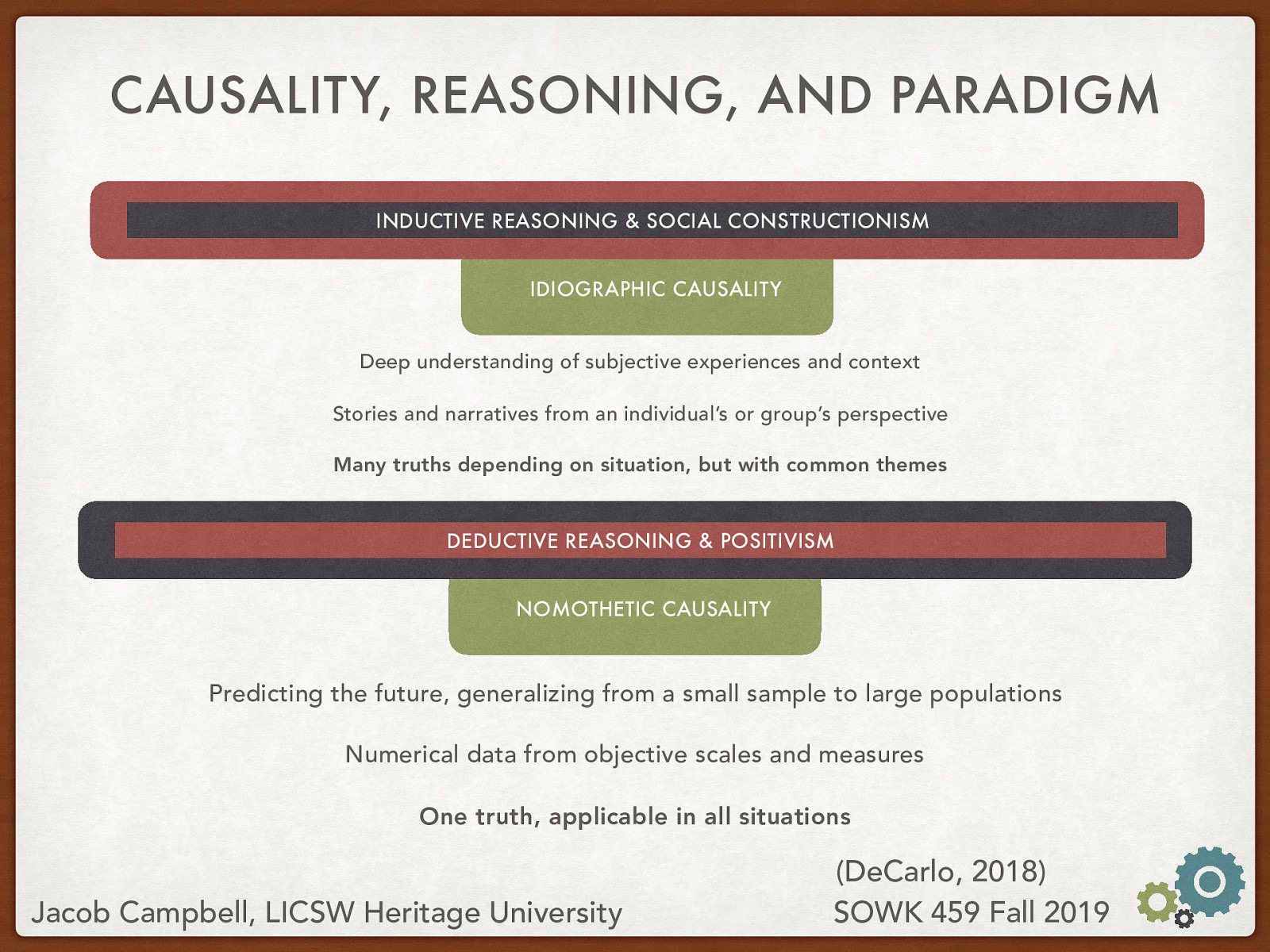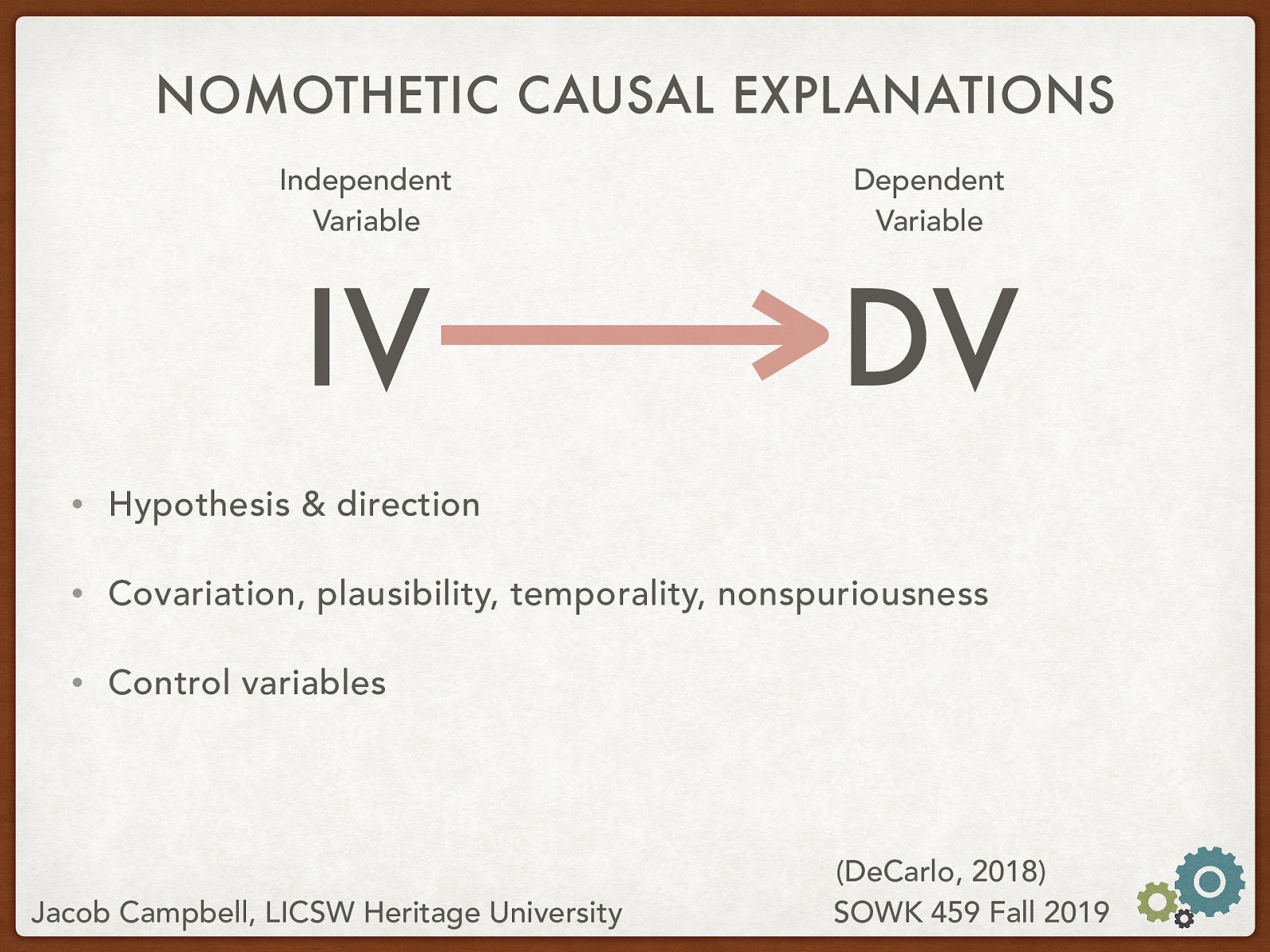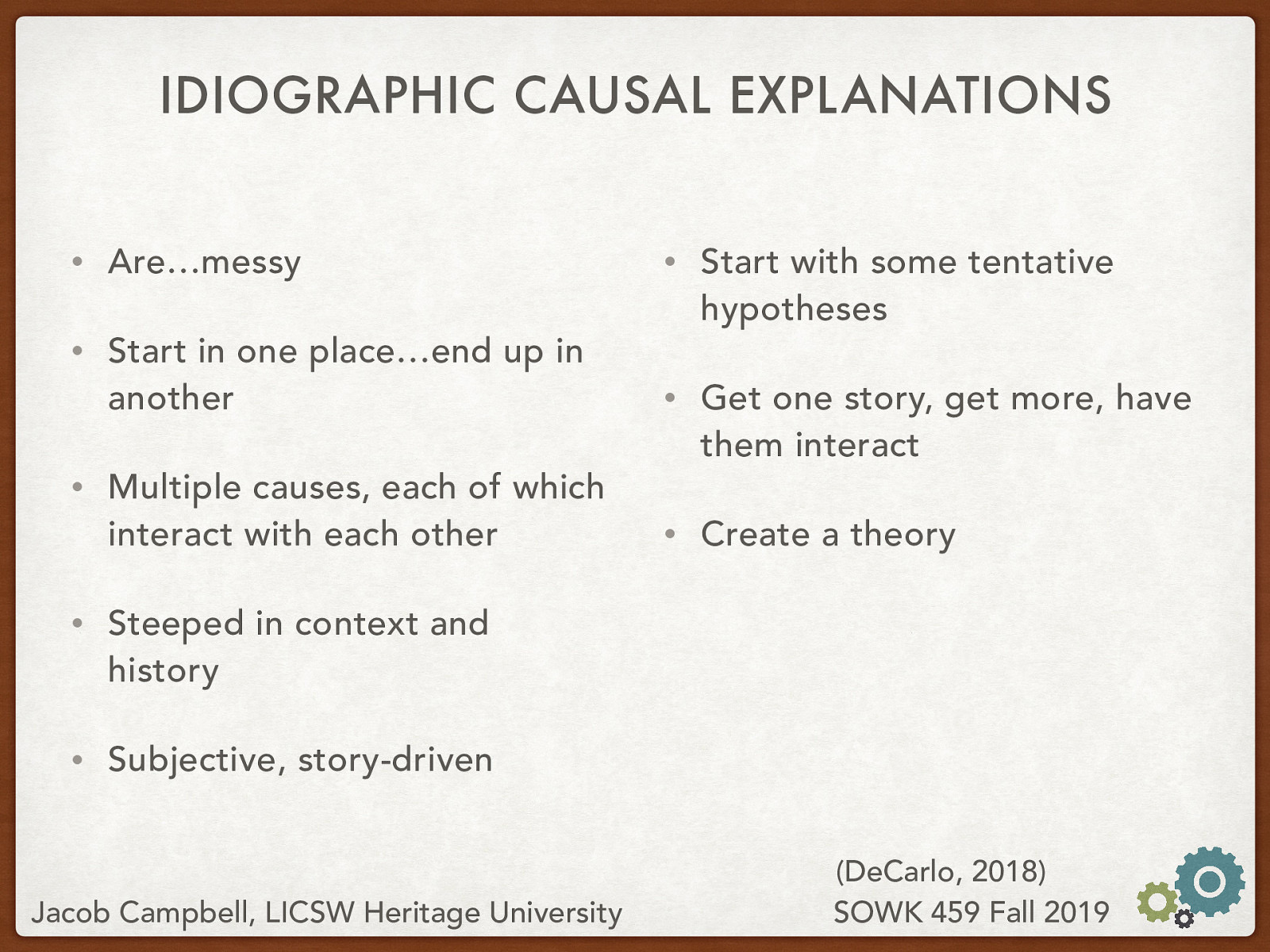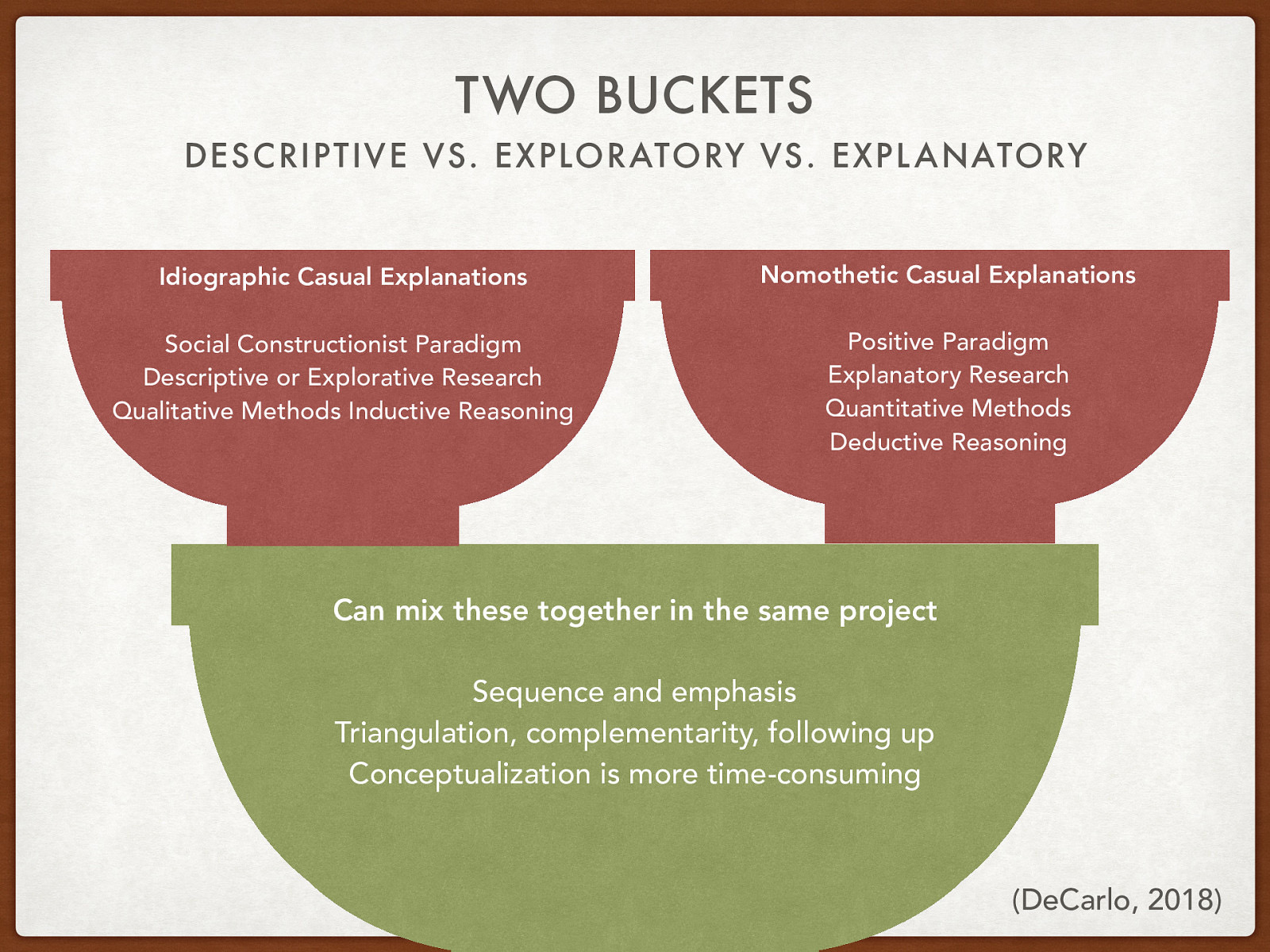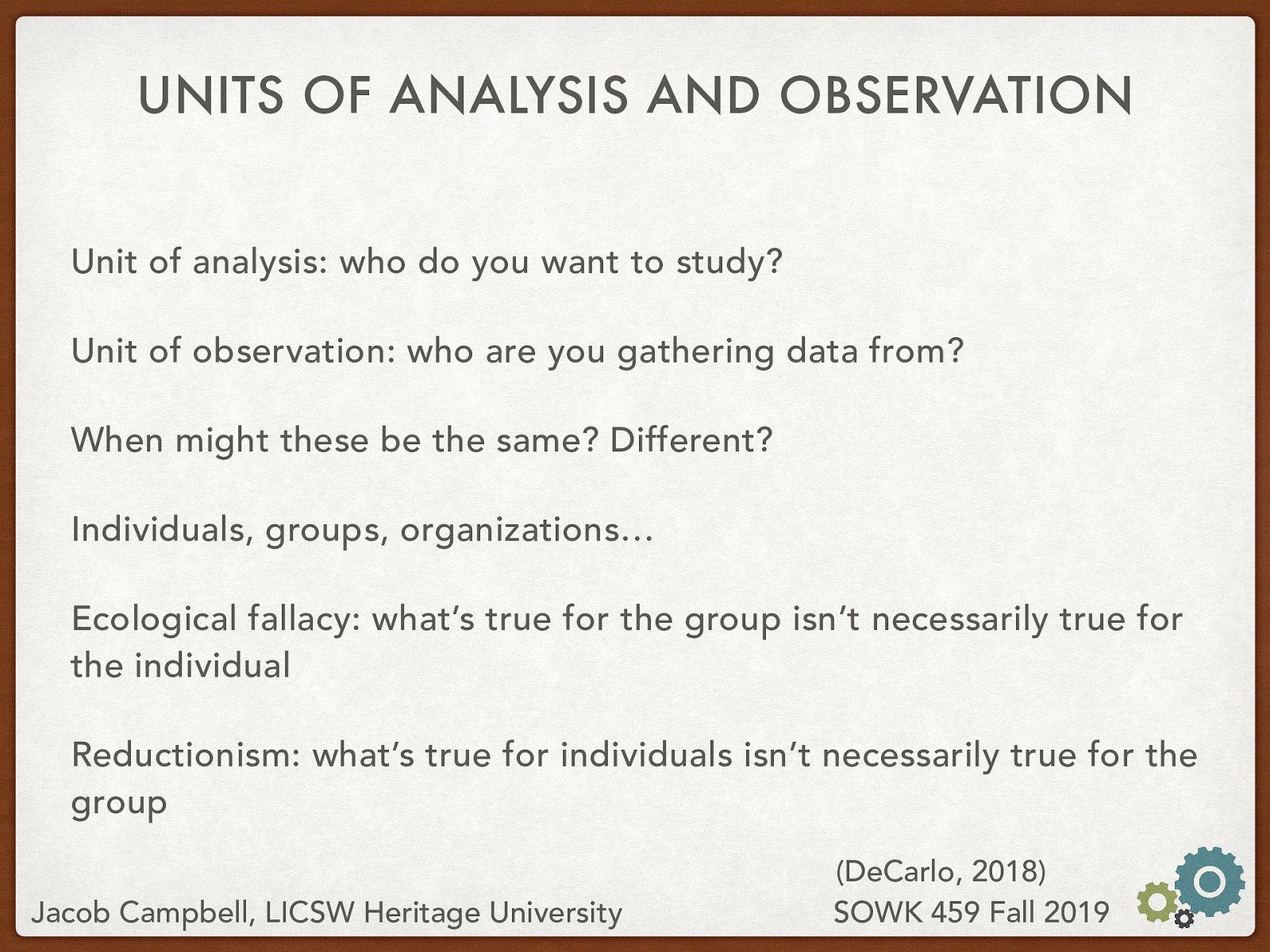Week 04 - Theoretical Frameworks - What is behind the research that we complete
A presentation at Heritage University in September 2019 by Jacob Campbell and is tagged with Heritage University, BASW Program, SOWK 459w
Description
A dive into theoretical frameworks as they relate to social science research methods. The agenda is as follows:
- Perspectives and theories
- Writing your theoretical framework
- Styles of reasoning for research
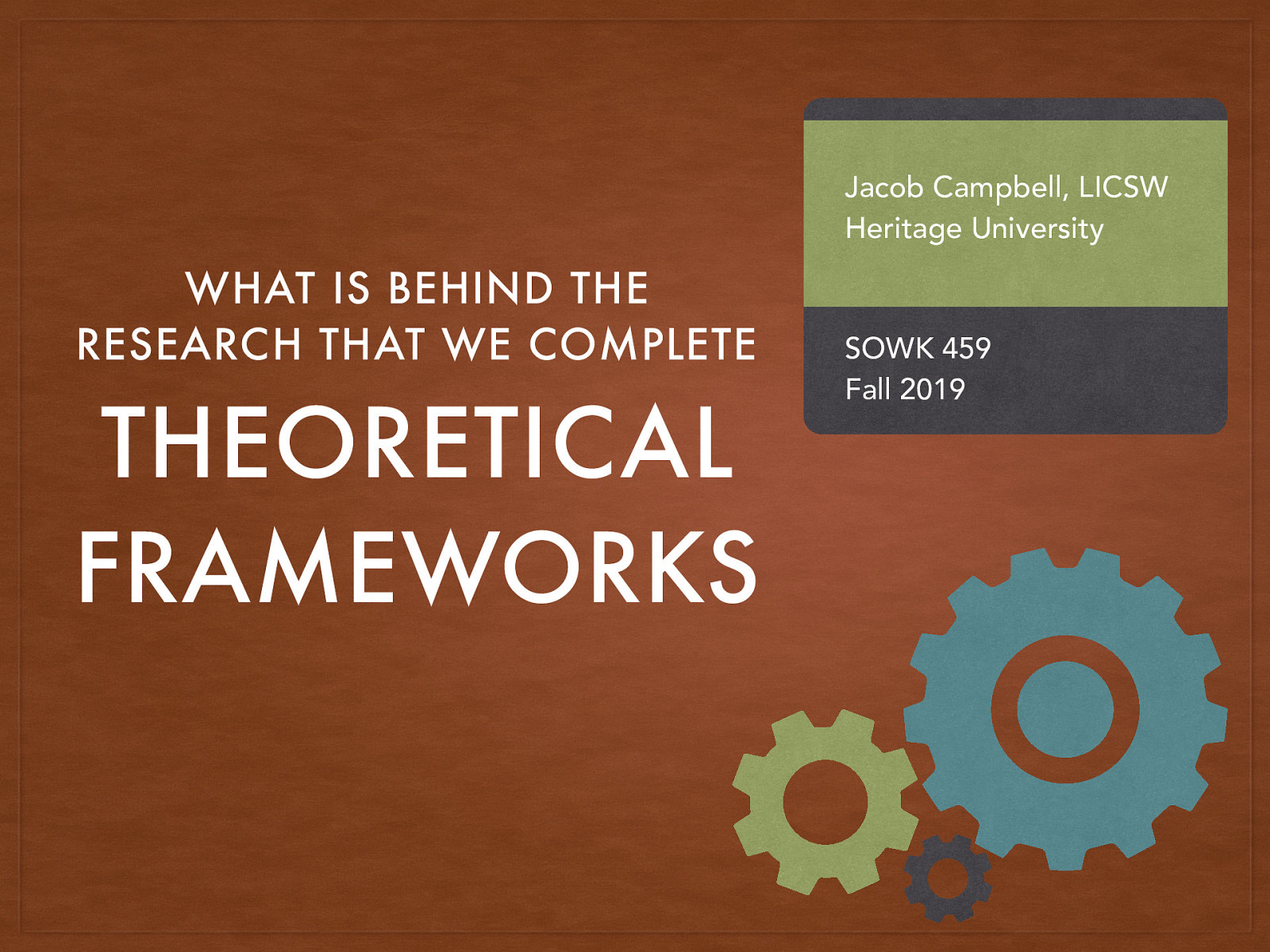
![Information taken from Julie Schillreff [Small Group Activity] Divide students up into three groups where they will come up with an explination regarding some satistical information. Organize students into groups of three using grouping cards Explain to students that most students who begin their freshman year at Heritage don’t earn a degree Give students to come up with an explanation for why this is happening Encourage them to draw diagrams to illustrate their explanation](https://presentations.jacobrcampbell.com/QvE8EJ/deck-3553-large-1.jpeg)
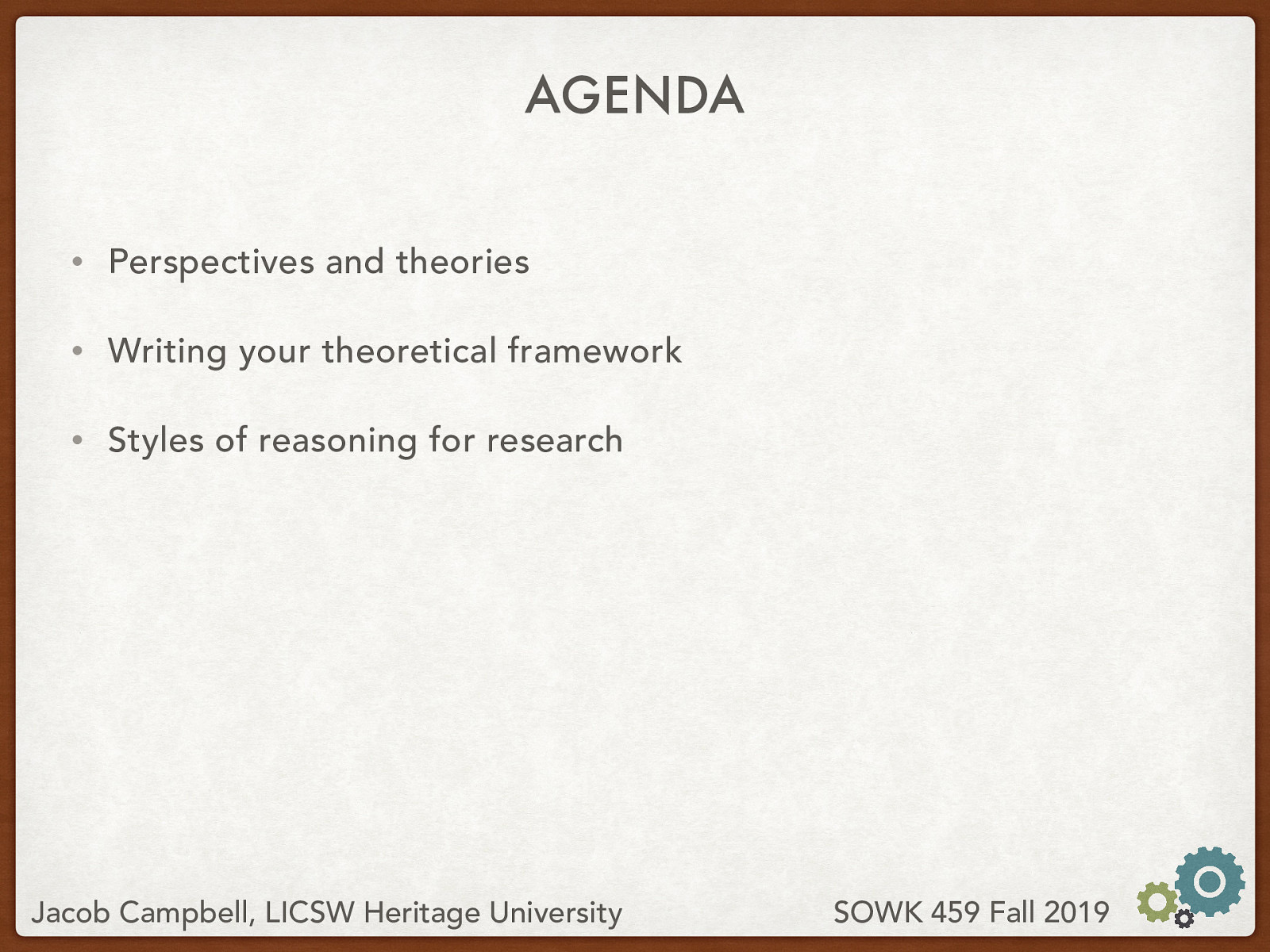
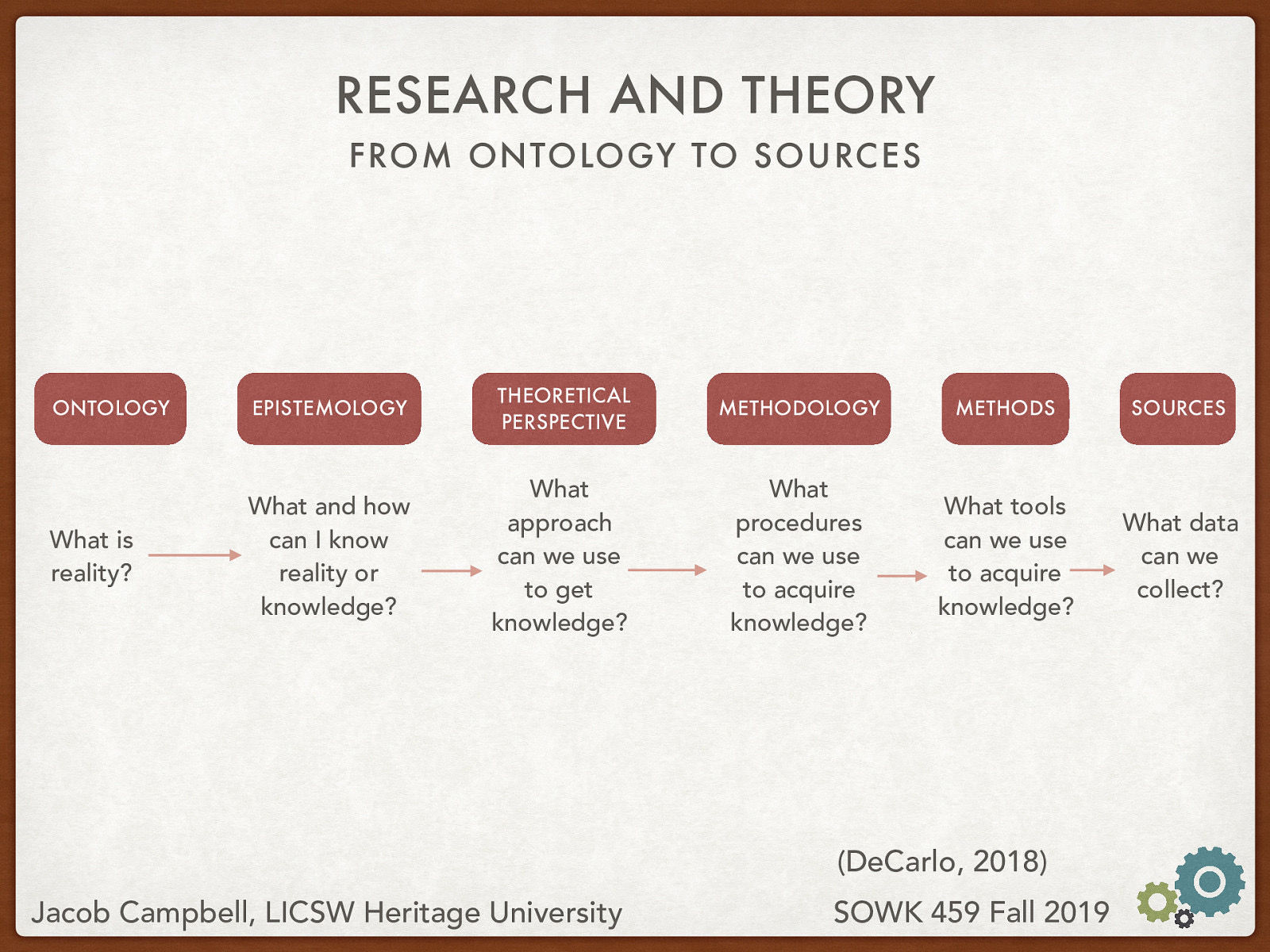
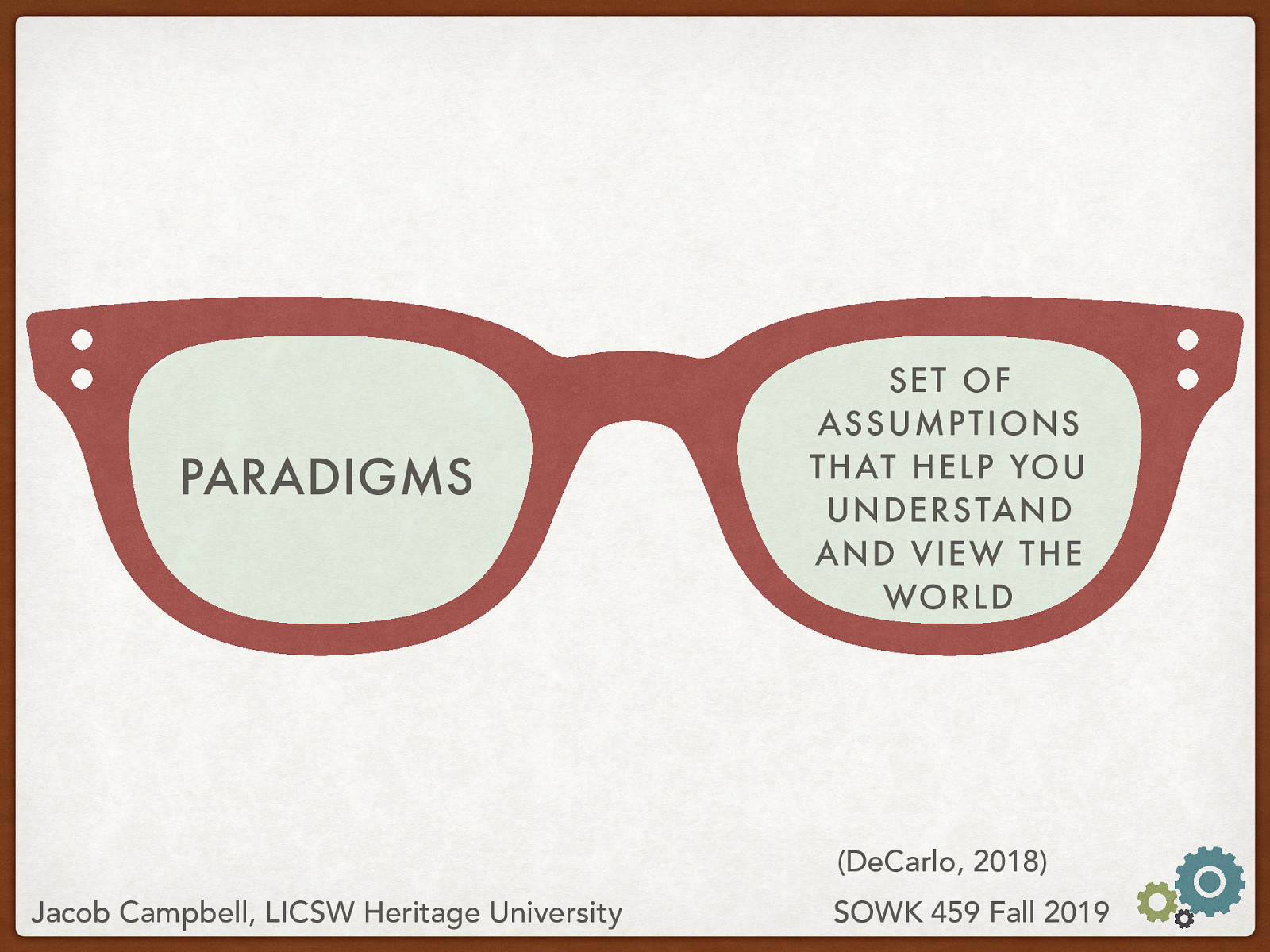
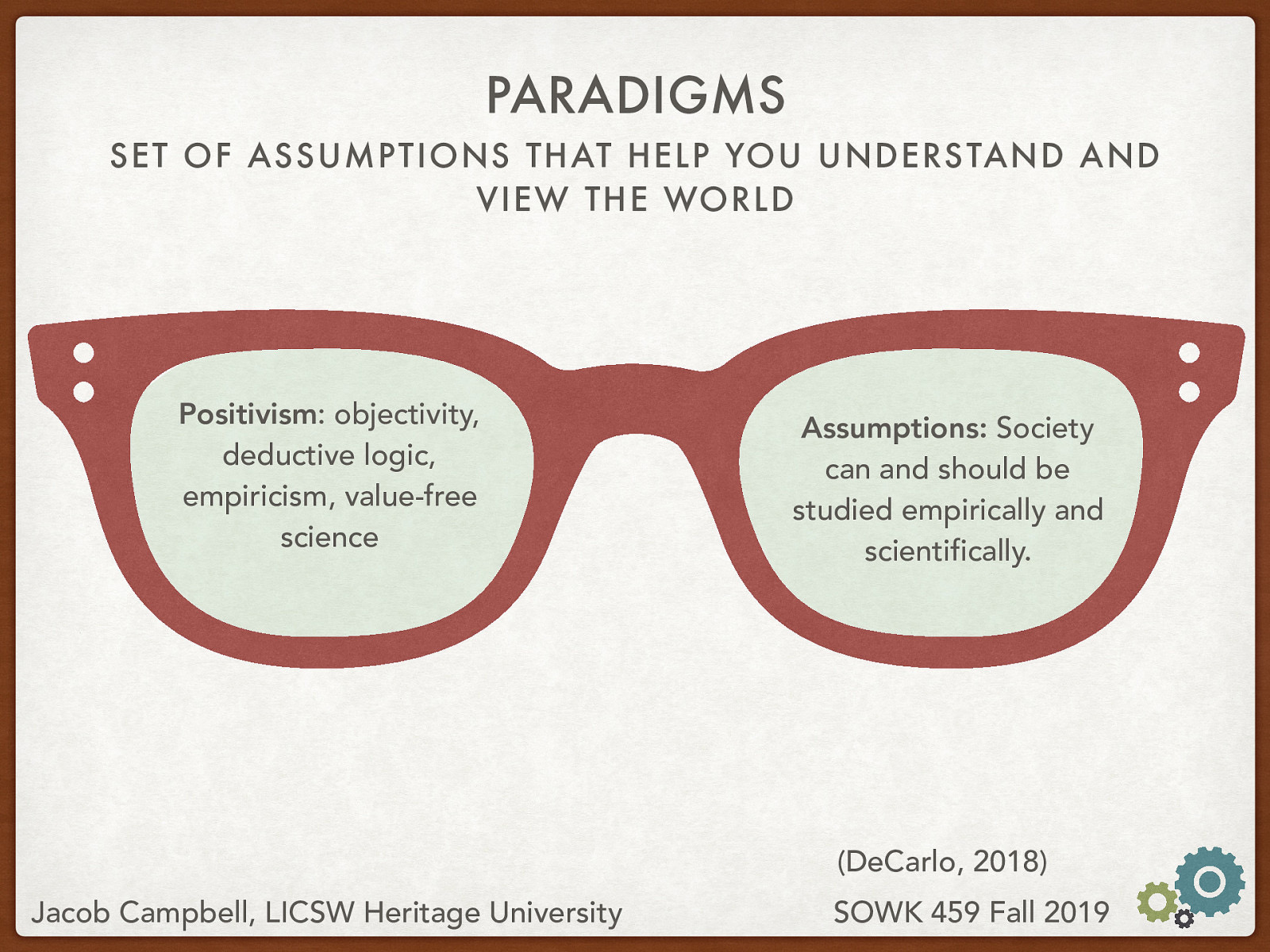
![DeCarlo (2018) describes an example of positivism in research as: An inquiry would look at “precisely measuring substance abuse and finding out the key causes of substance abuse during adolescence. Forgoing the objectivity of precisely measuring substance abuse” [Whole Class Activity] Discuss what this looks like. Photo Credit: Matthew T Rader](https://presentations.jacobrcampbell.com/QvE8EJ/deck-3553-large-6.jpeg)
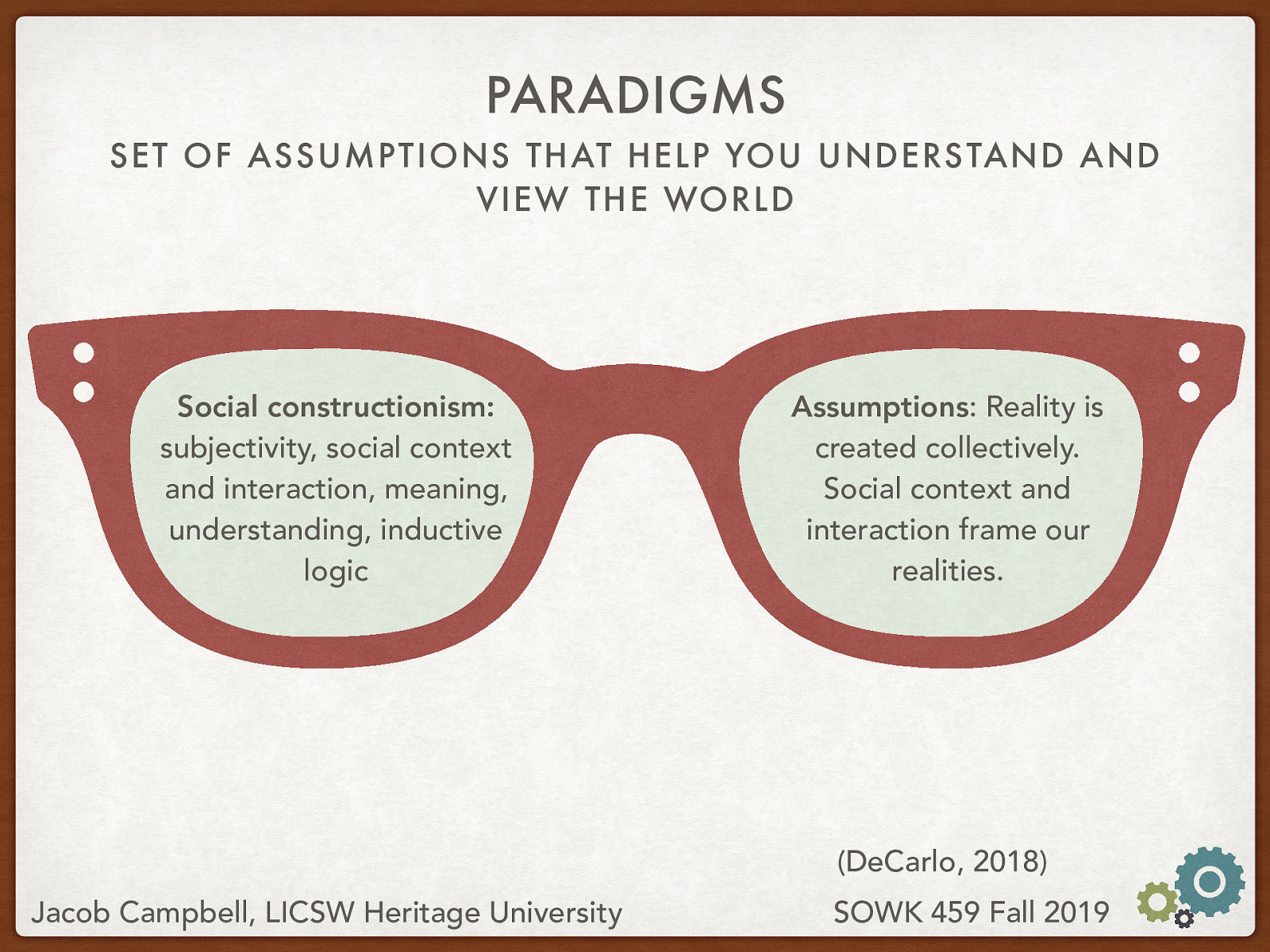
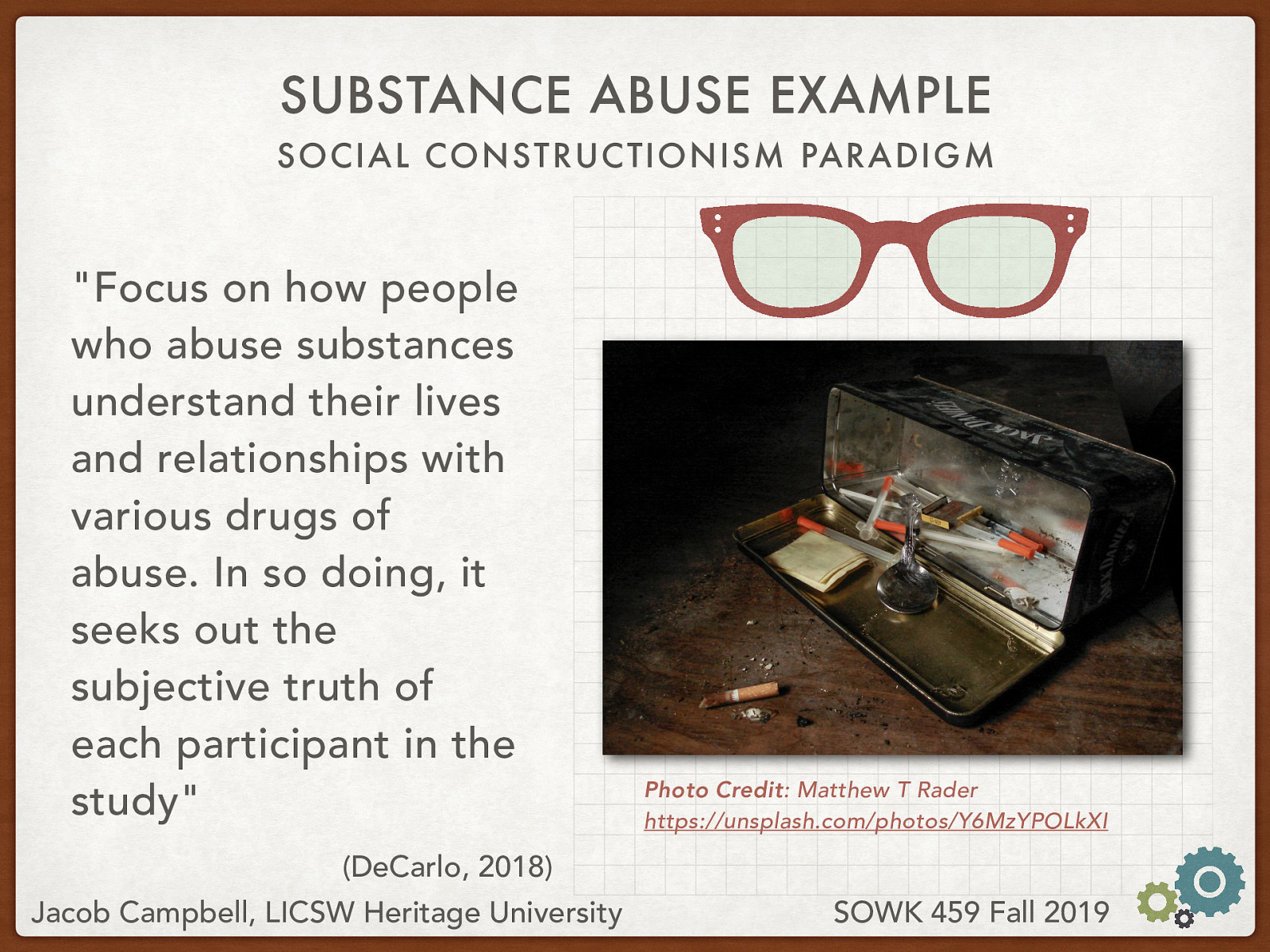
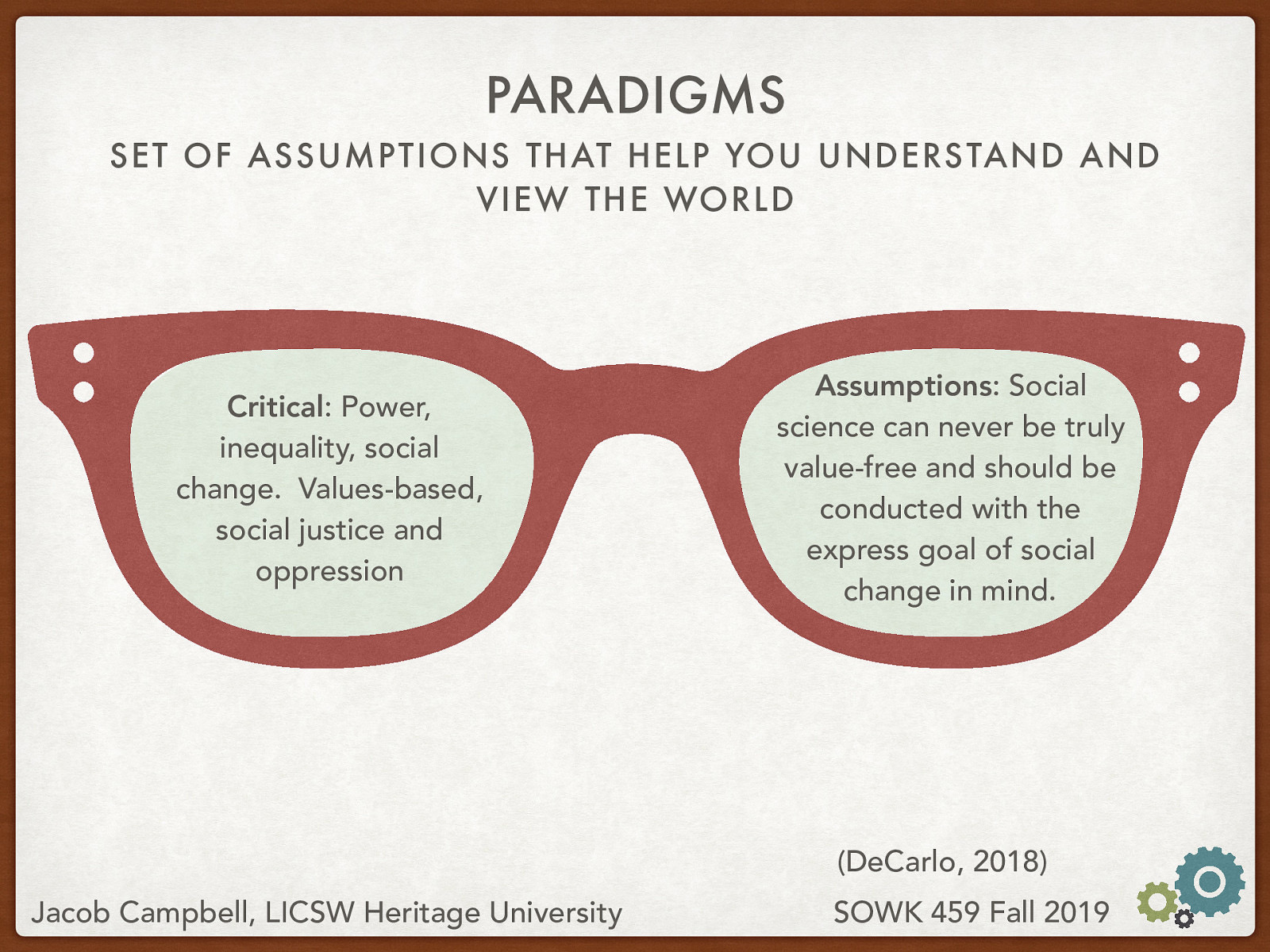
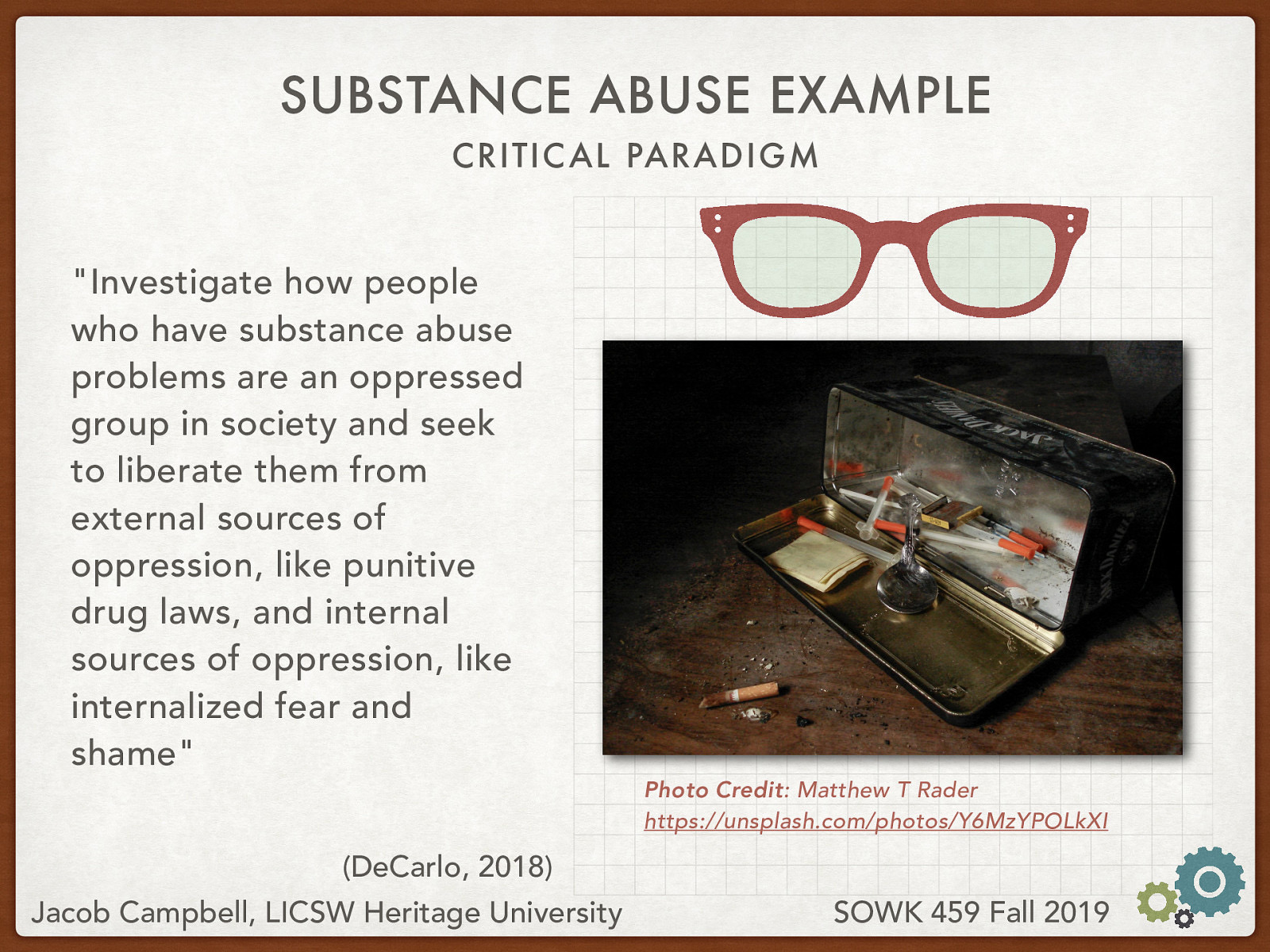
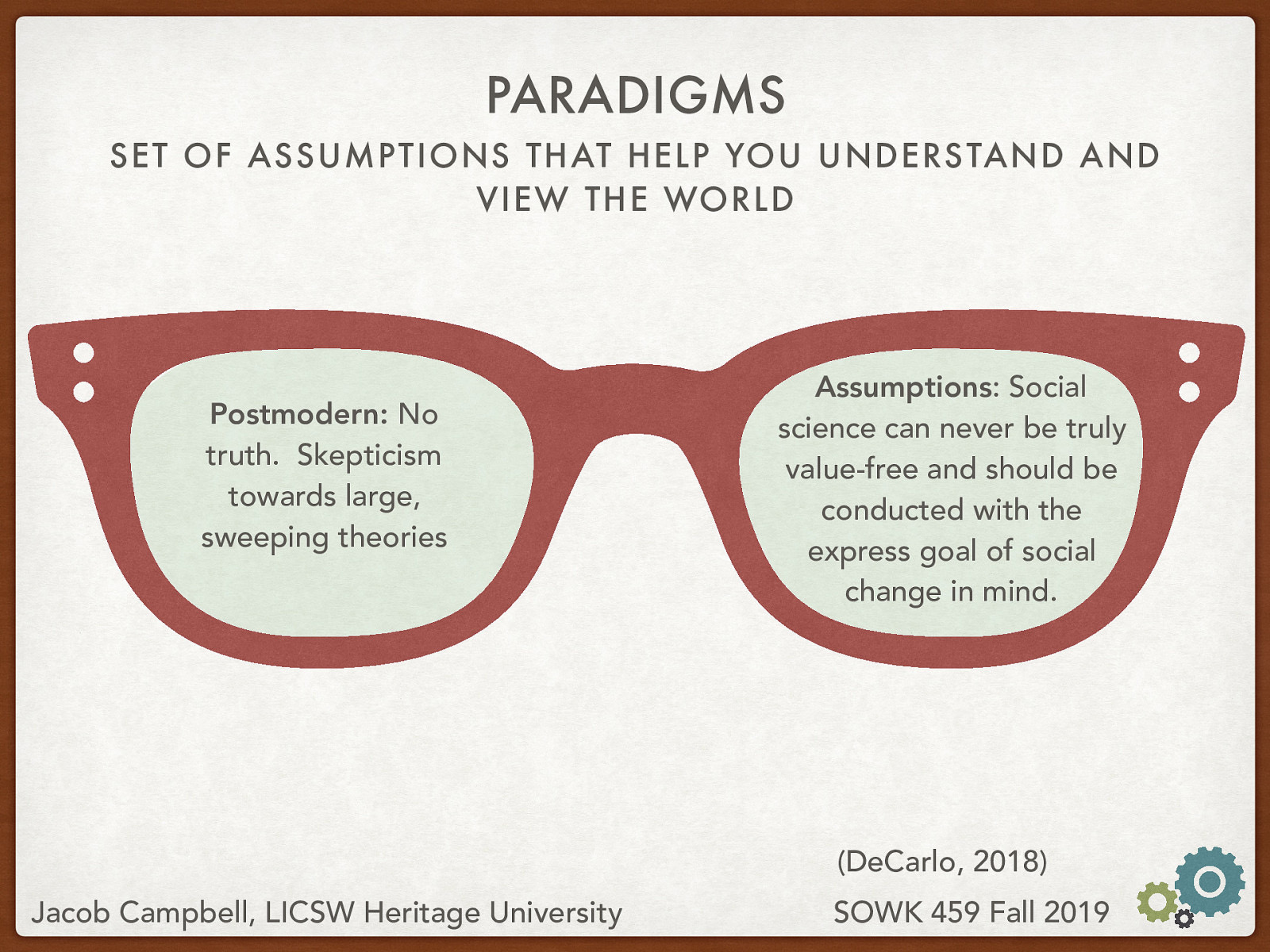
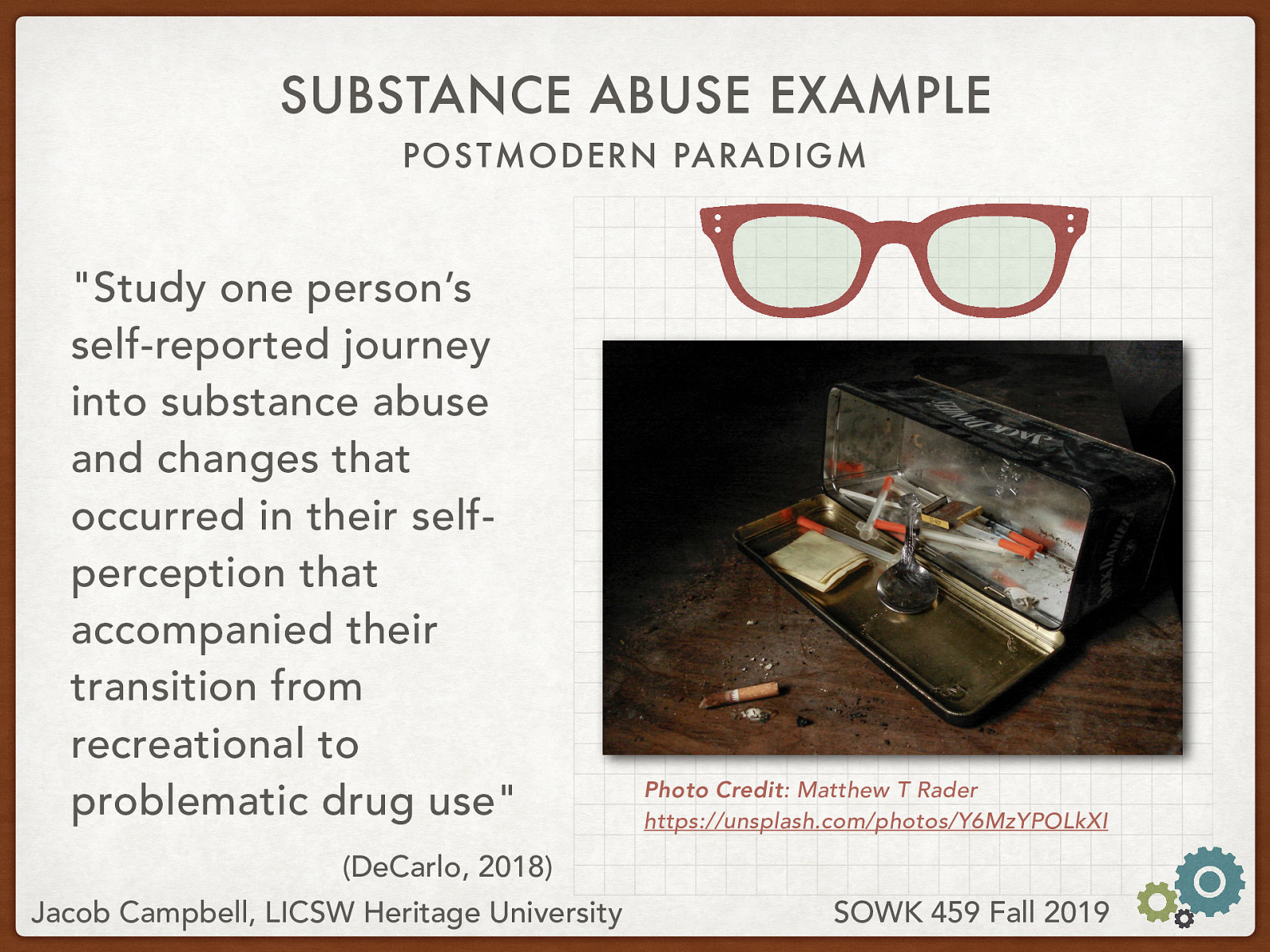
![So we’ve talked breifly about the various paradigms that are out there. Look at this statement, and try to think below what is going on with the statement (e.g., what are the assumptions made) and what is wrong with this statement. “When a scientist observes the world, he does so objectively.” [Small Group Activity] Talk with a partner about what kind of problems you might see with the statement. [Whole Class Activity] Follow up with class. Attempt to draw out the following potential problems: Gender Use of prior experiences—impossible to step outside of world Ignores the sociology of science Subject does not have any agency Who gets to be a scientist?](https://presentations.jacobrcampbell.com/QvE8EJ/deck-3553-large-13.jpeg)
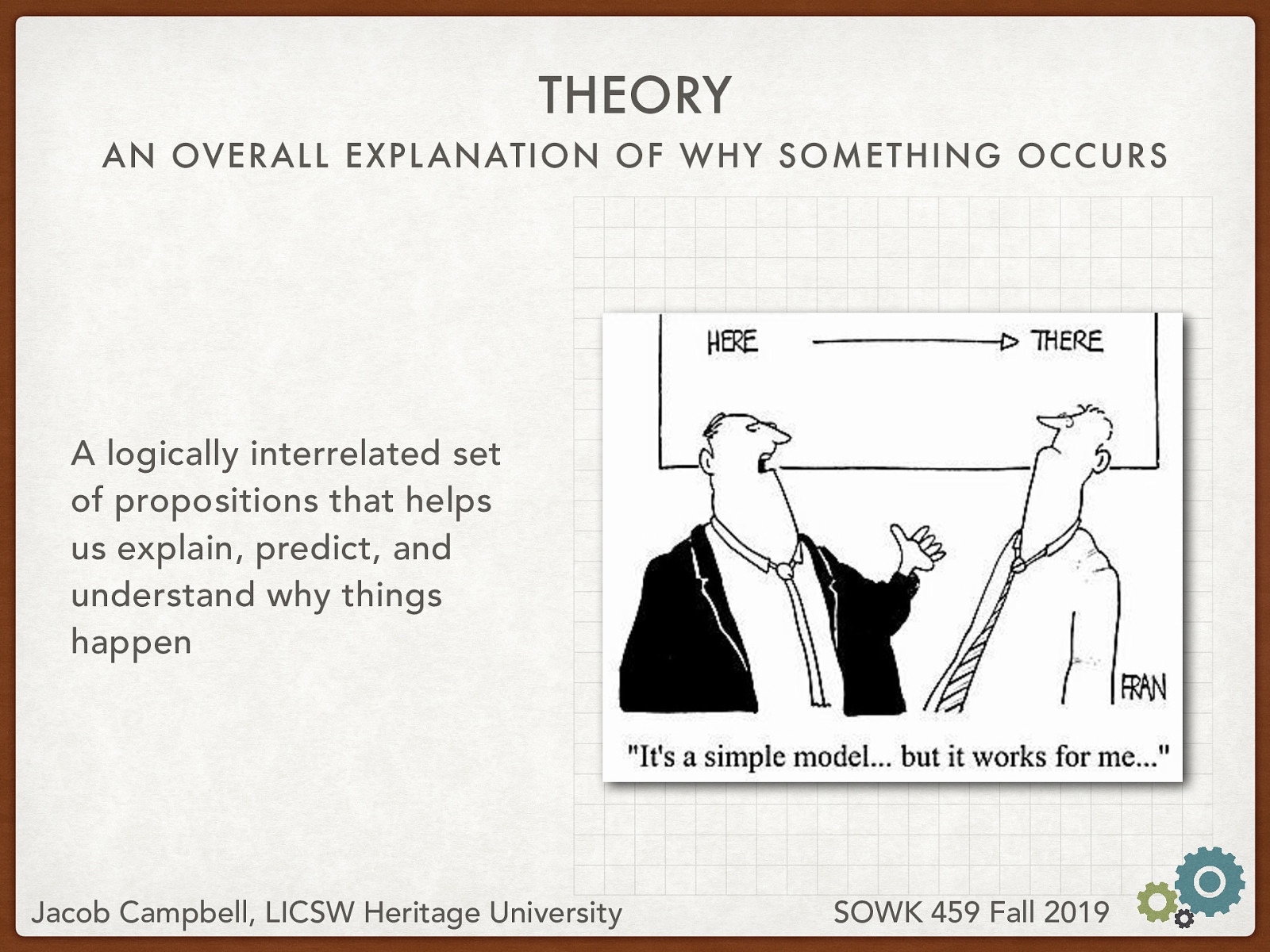
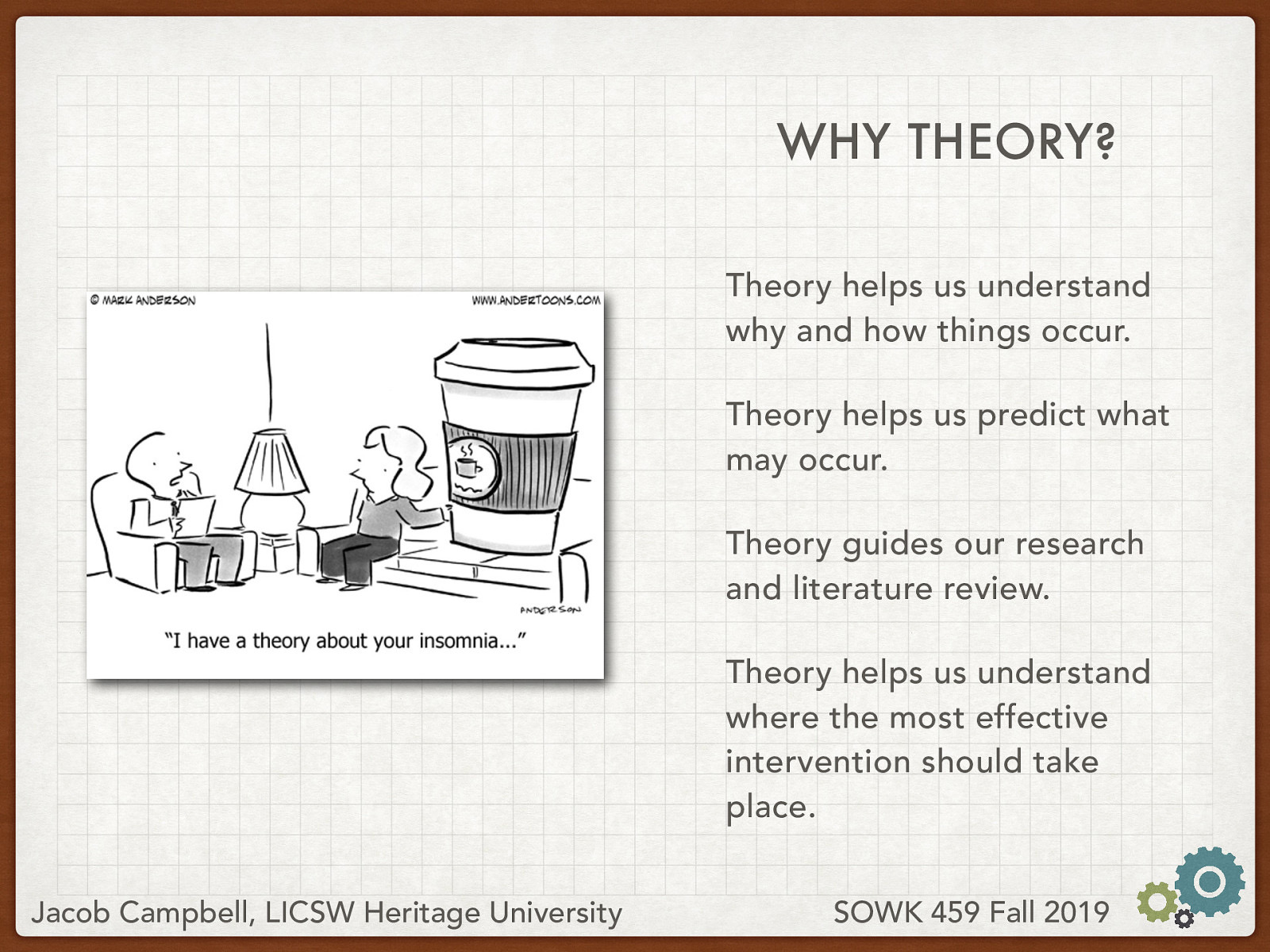
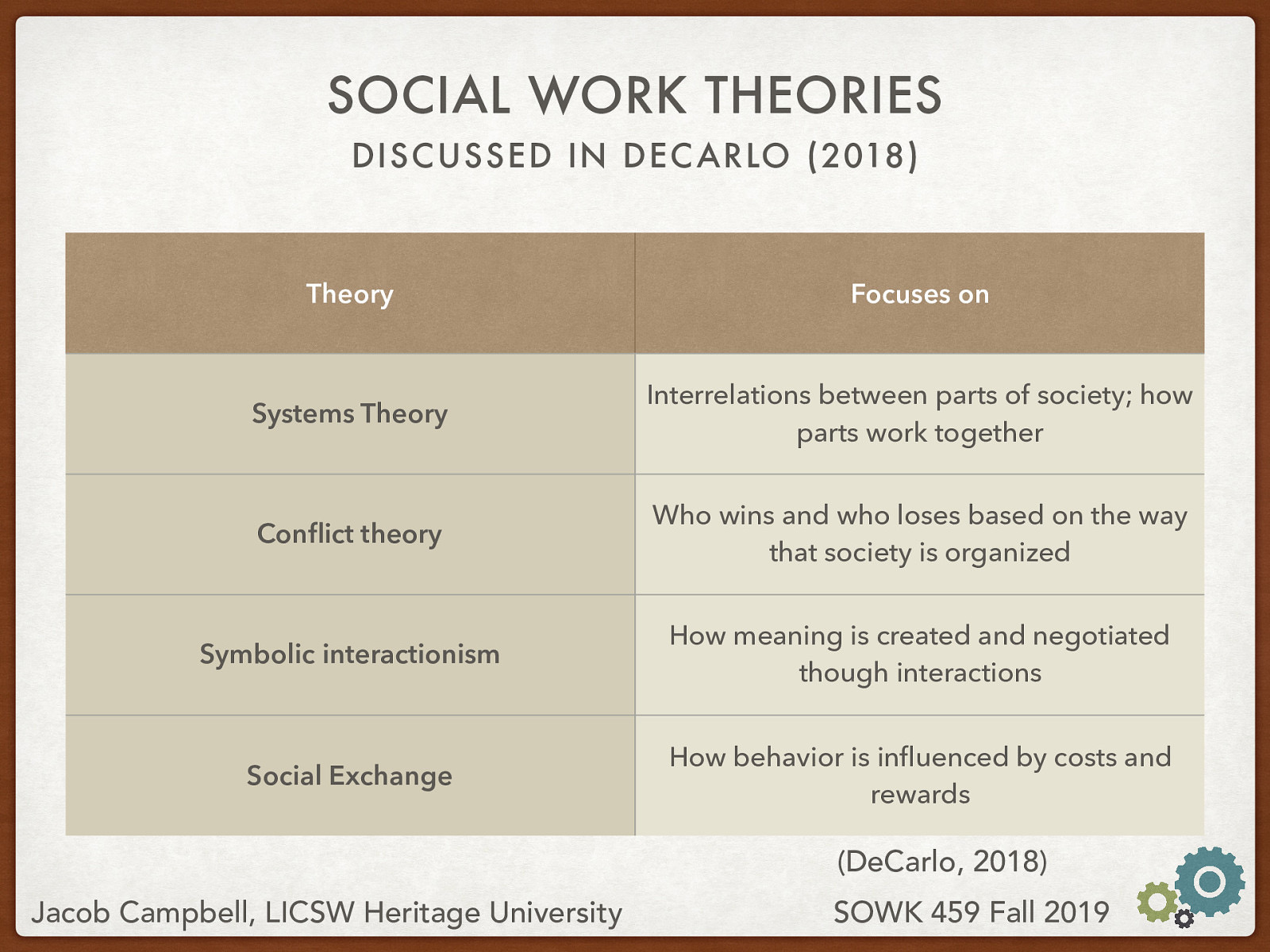
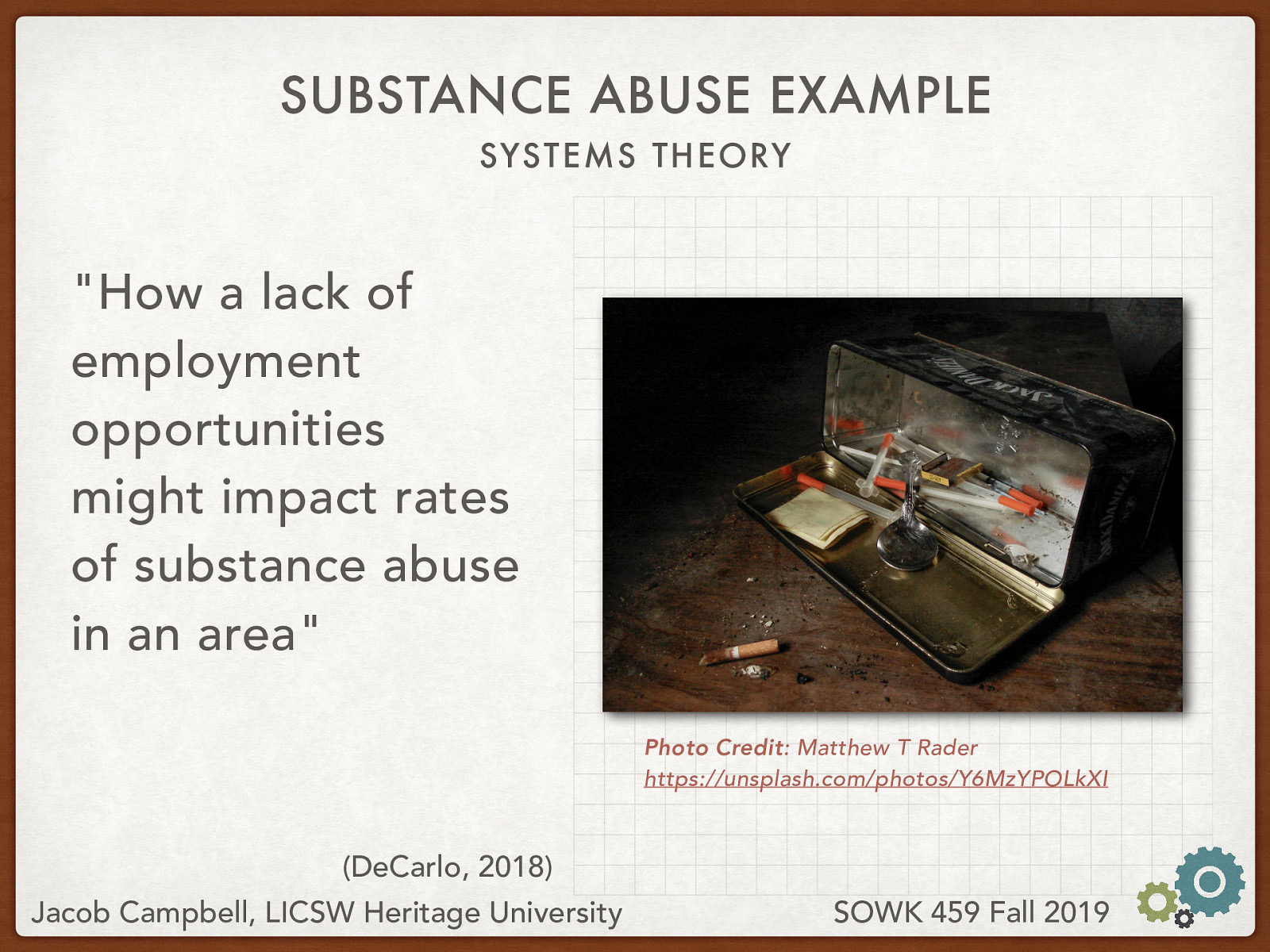
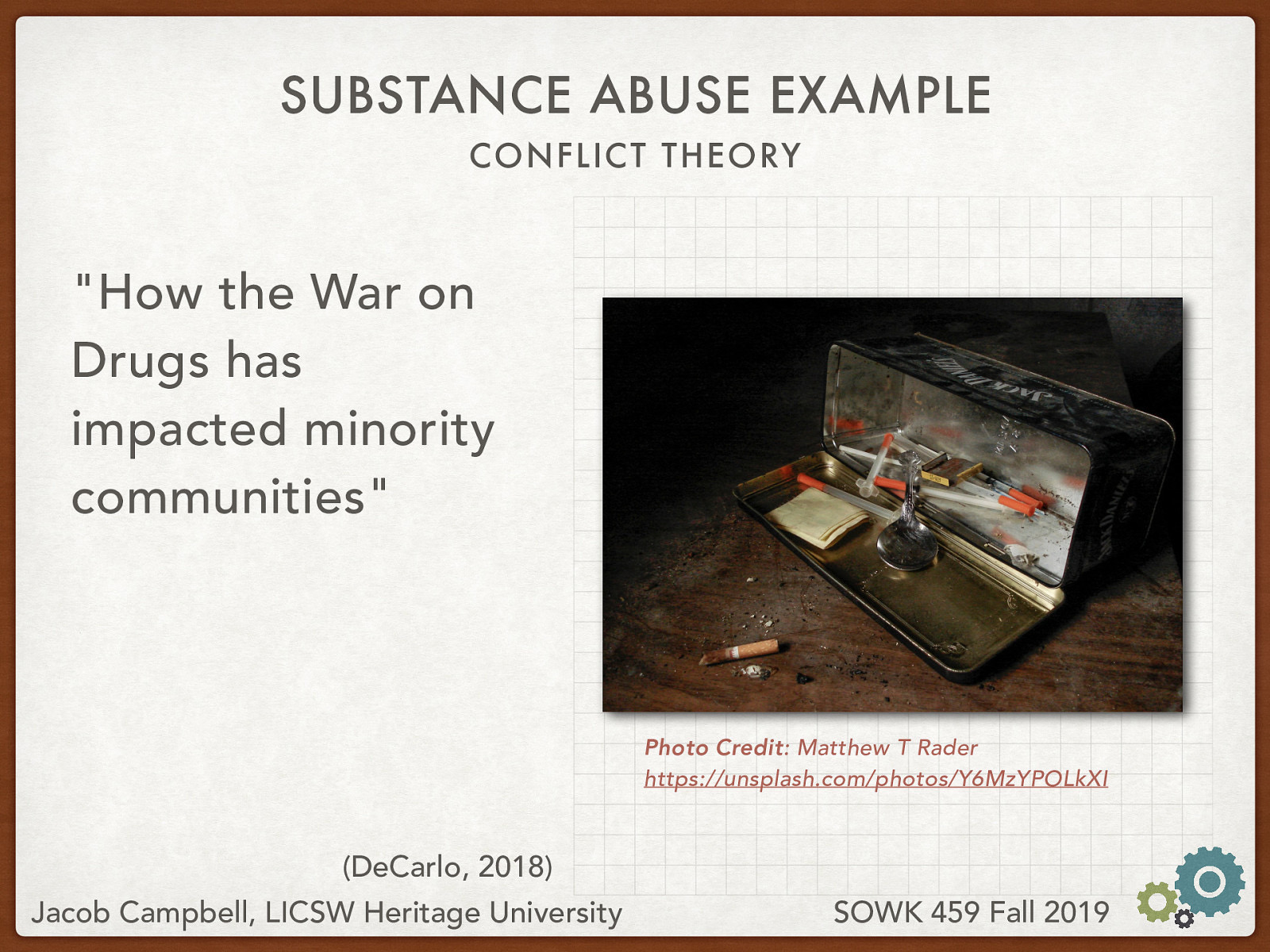
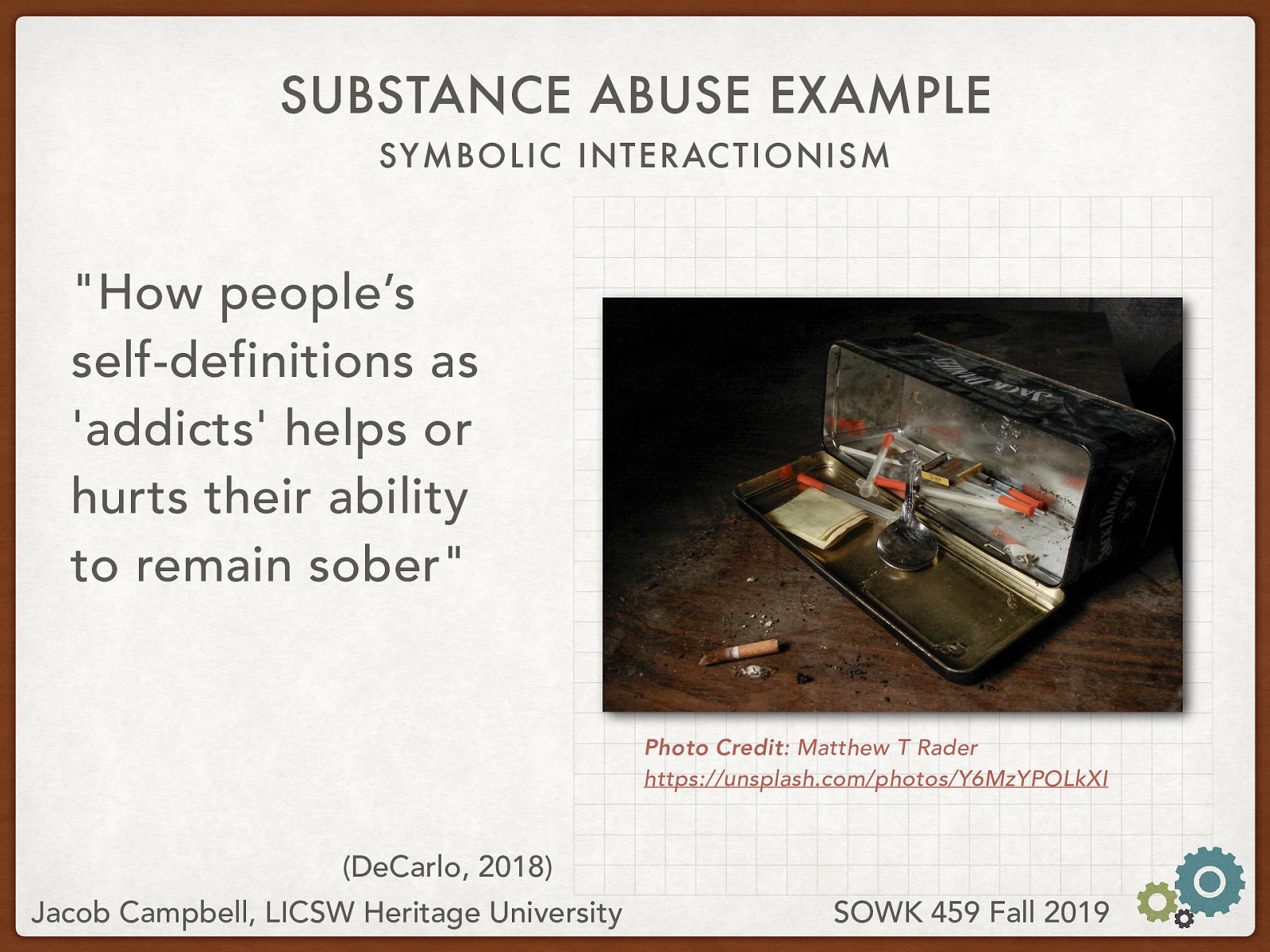
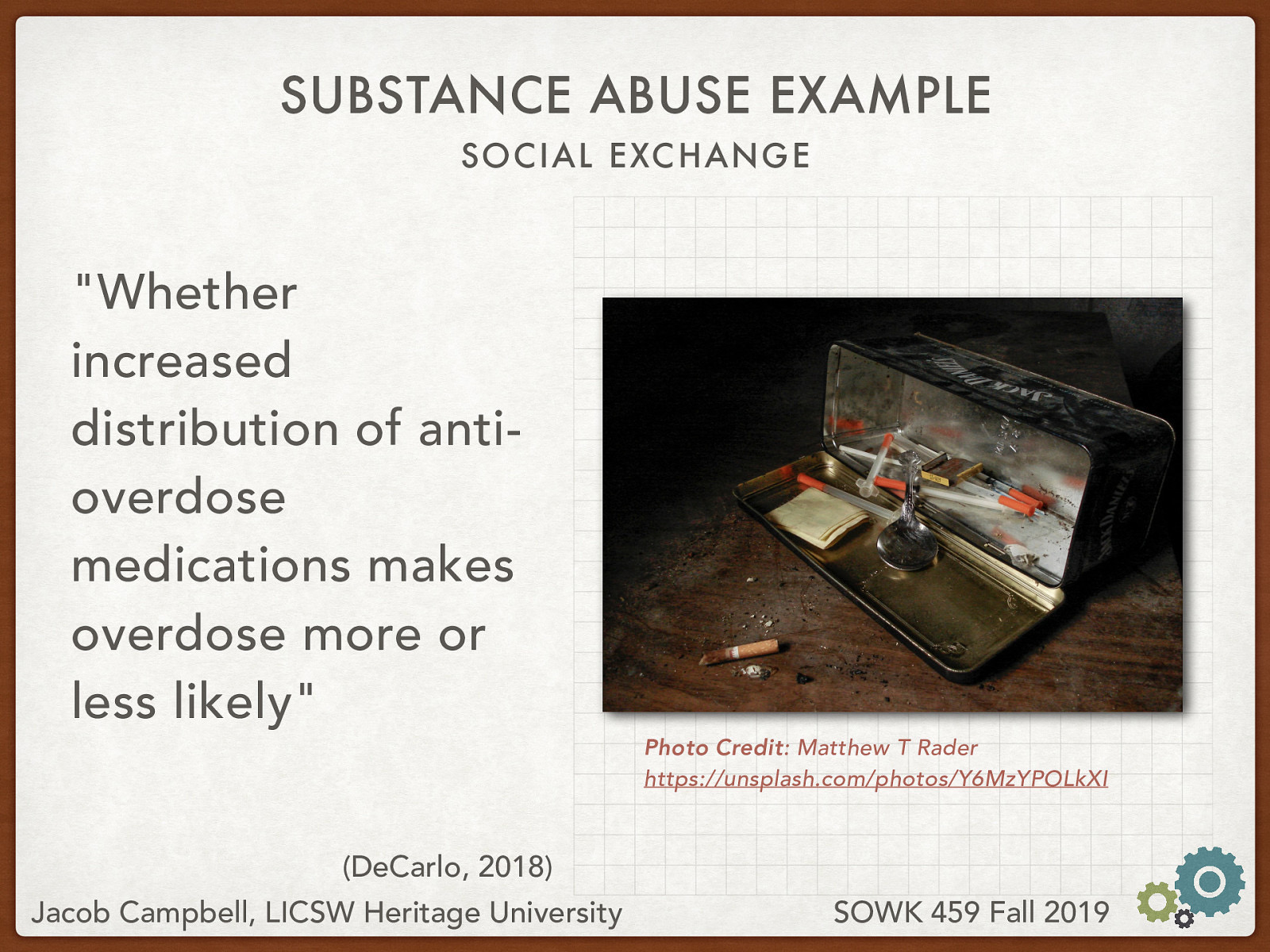
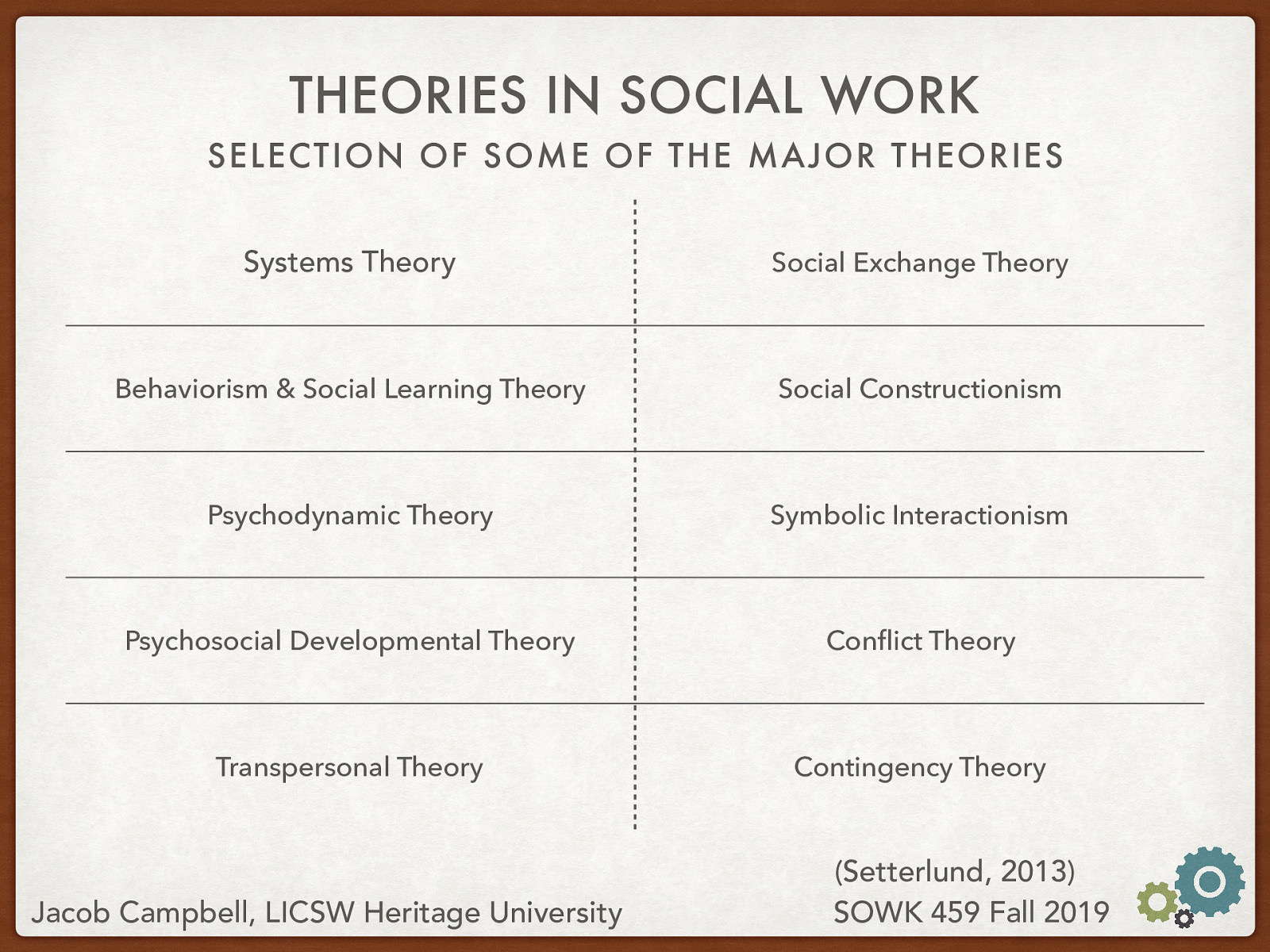
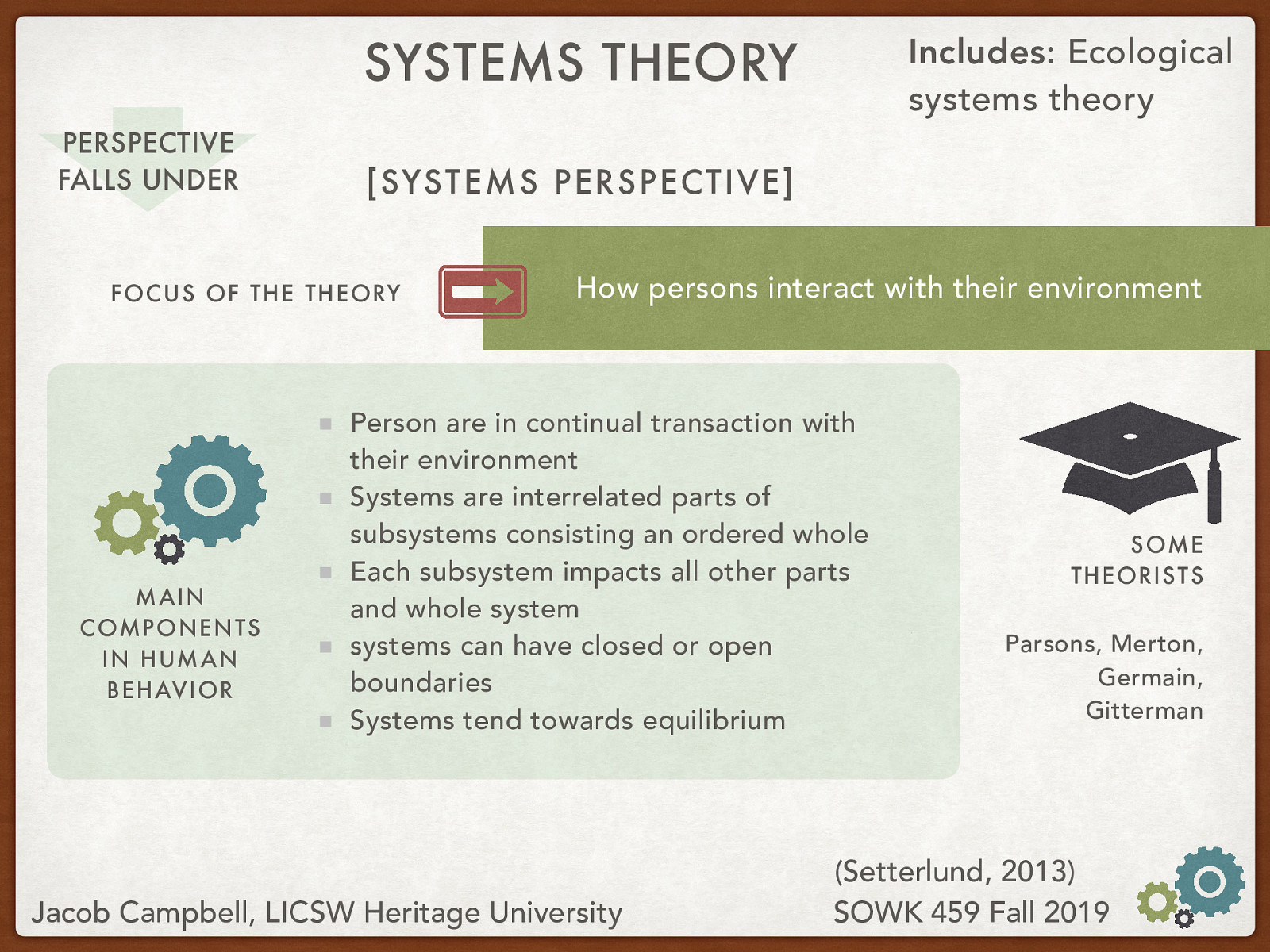
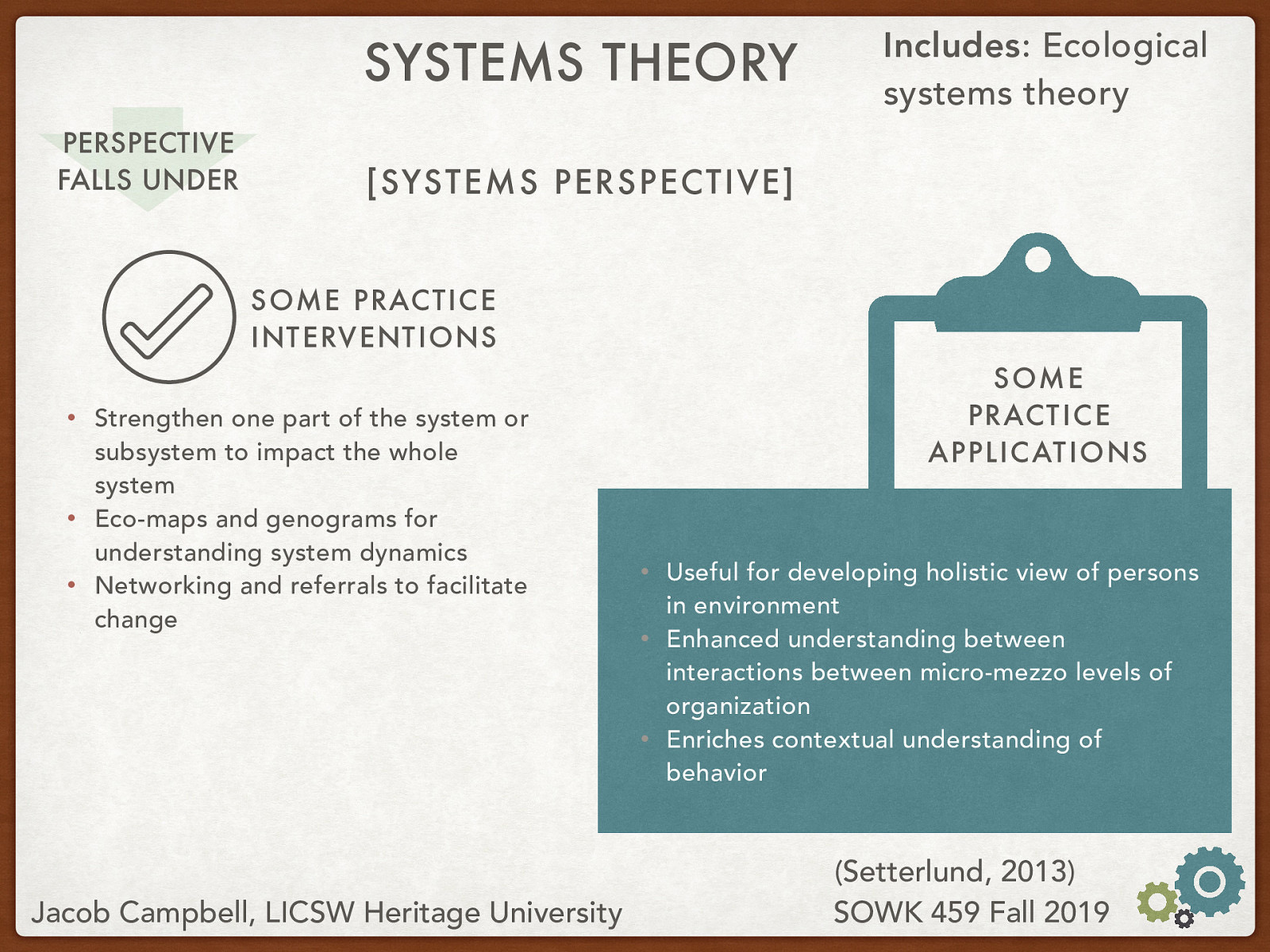
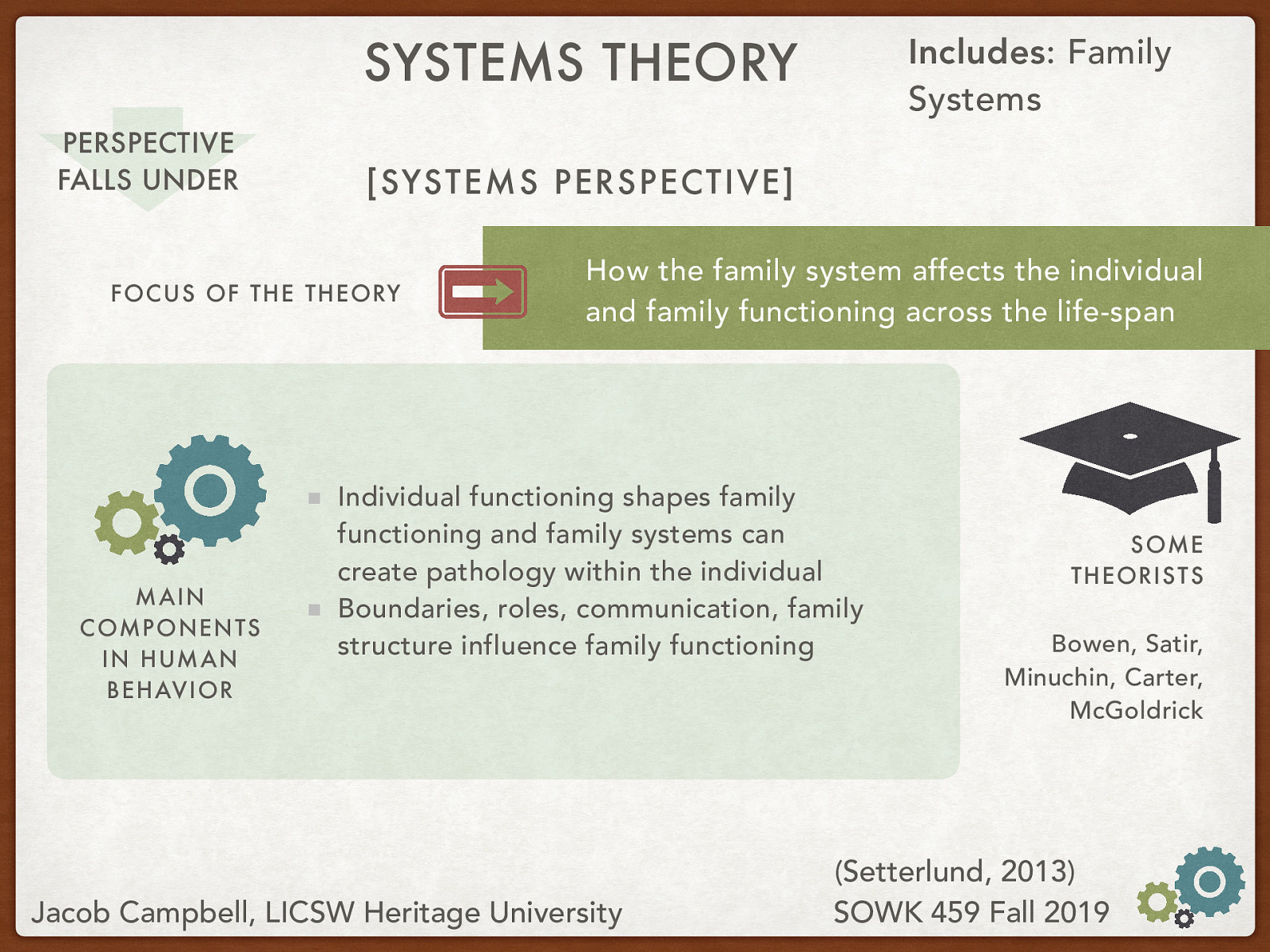
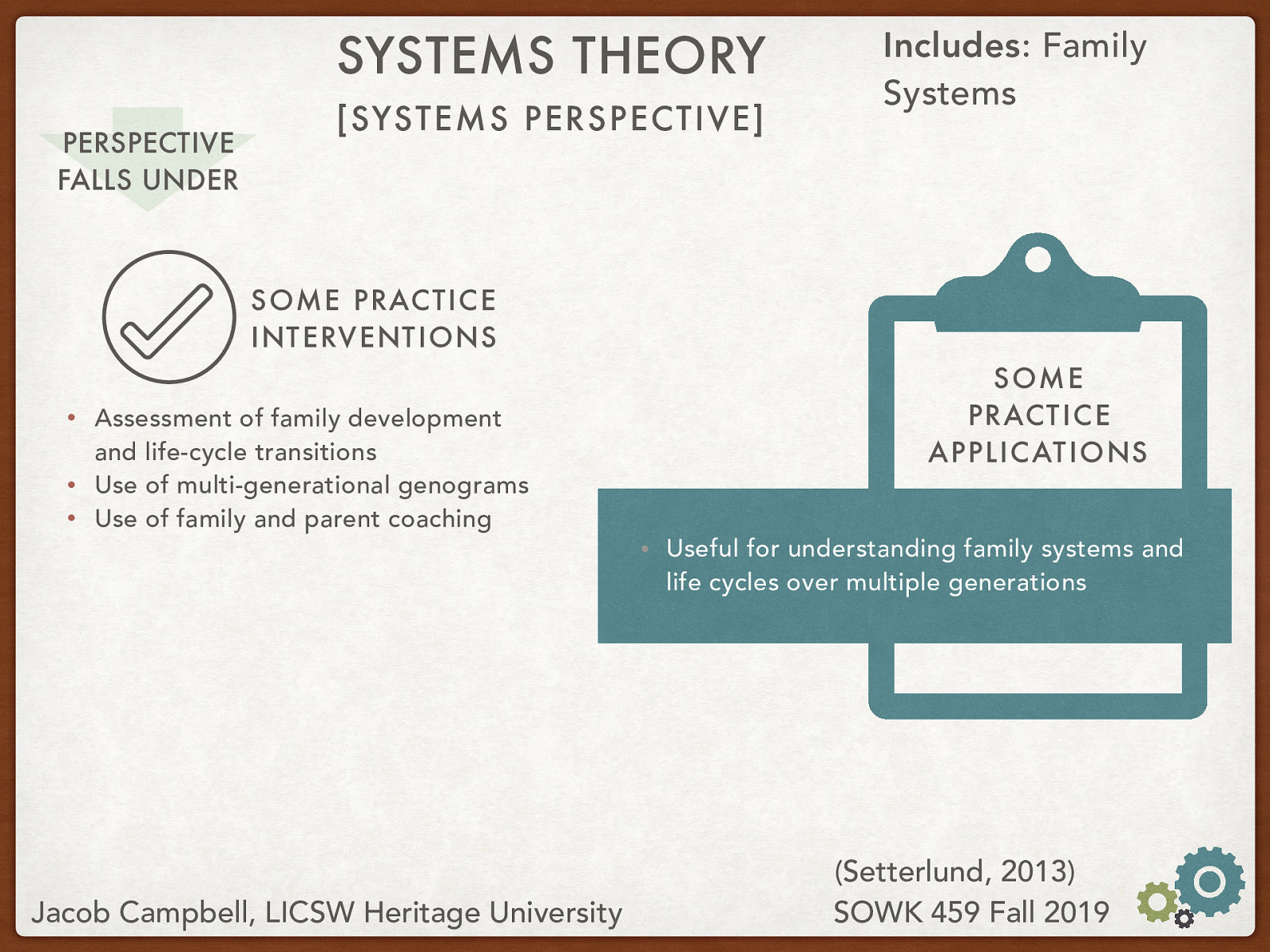
![Theory Name: Behaviorism & Social Learning Theory Underlying Perspective: [Social Behavioral Perspective] Theories Included: Cognitive theory, behavioral theory, social learning theory Focus of the Theory: How individuals develop cognitive functioning and learn through acting on their environment Main Components in Human Behavior: Imitation & reaction to stimulation shape behavioral learning Knowledge is constructed through children physically and mentally acting on objects Intelligence is an evolutionary, biological adaptation to environment Cognitive structures enable adaptation & organization Theorists: Pavlov, Skinner, Watson, Piaget, Bandura, Beck](https://presentations.jacobrcampbell.com/QvE8EJ/deck-3553-large-26.jpeg)
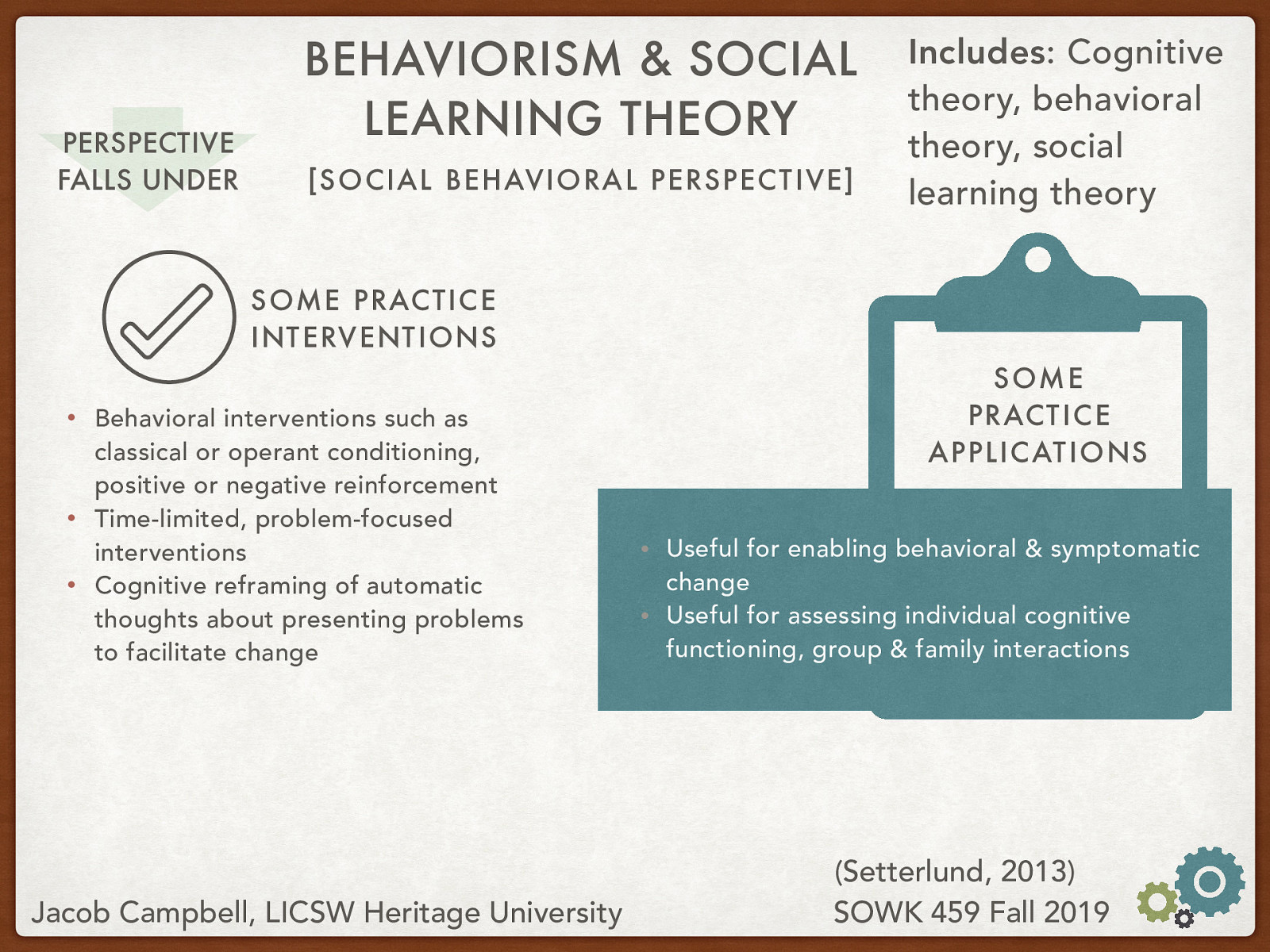
![Theory Name: Psychodynamic Theory Underlying Perspective: [Psychodynamic Perspective] Theories Included: Classical psycho-dynamic theory, ego-psychology,object-relations theory, self-psychology Focus of the Theory: How inner energies and external forces interact to impact emotional development Main Components in Human Behavior: Unconscious and conscious mental activity motivate human behavior Ego functions mediate between individual and environment Ego defense mechanisms protect individuals from becoming overwhelmed by unacceptable impulses and threats Internalized experiences shape personality development and functioning Healing occurs through attention to transferences and the treatment relationship Theorists: S. Freud, Adler, Jung, Horney, A. Freud, Kernberg, Kohut, Klein, Mahler, Bowlby](https://presentations.jacobrcampbell.com/QvE8EJ/deck-3553-large-28.jpeg)
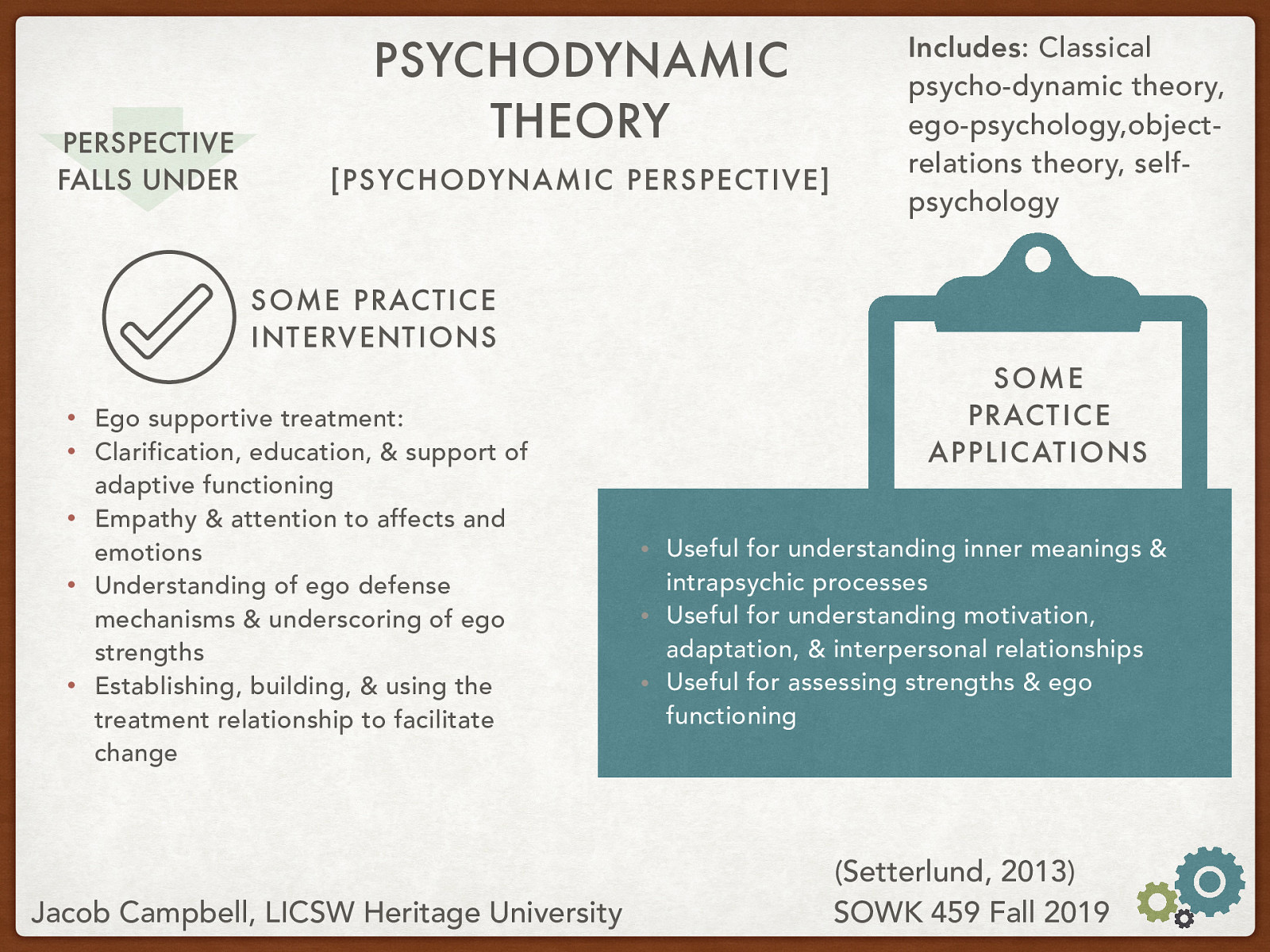
![Theory Name: Psychosocial Developmental Theory Underlying Perspective: [Developmental Perspective] Theories Included: Erikson’s theory of development Focus of the Theory: How internal & external forces shape life development, generally by life stages Main Components in Human Behavior: Human development occurs in defined & qualitatively different stages that are sequential & may be universal Individual stages of development include specific tasks to be completed & crises to be managed Time & social context shape & individualize the meaning of life stages Theorists: Erikson](https://presentations.jacobrcampbell.com/QvE8EJ/deck-3553-large-30.jpeg)
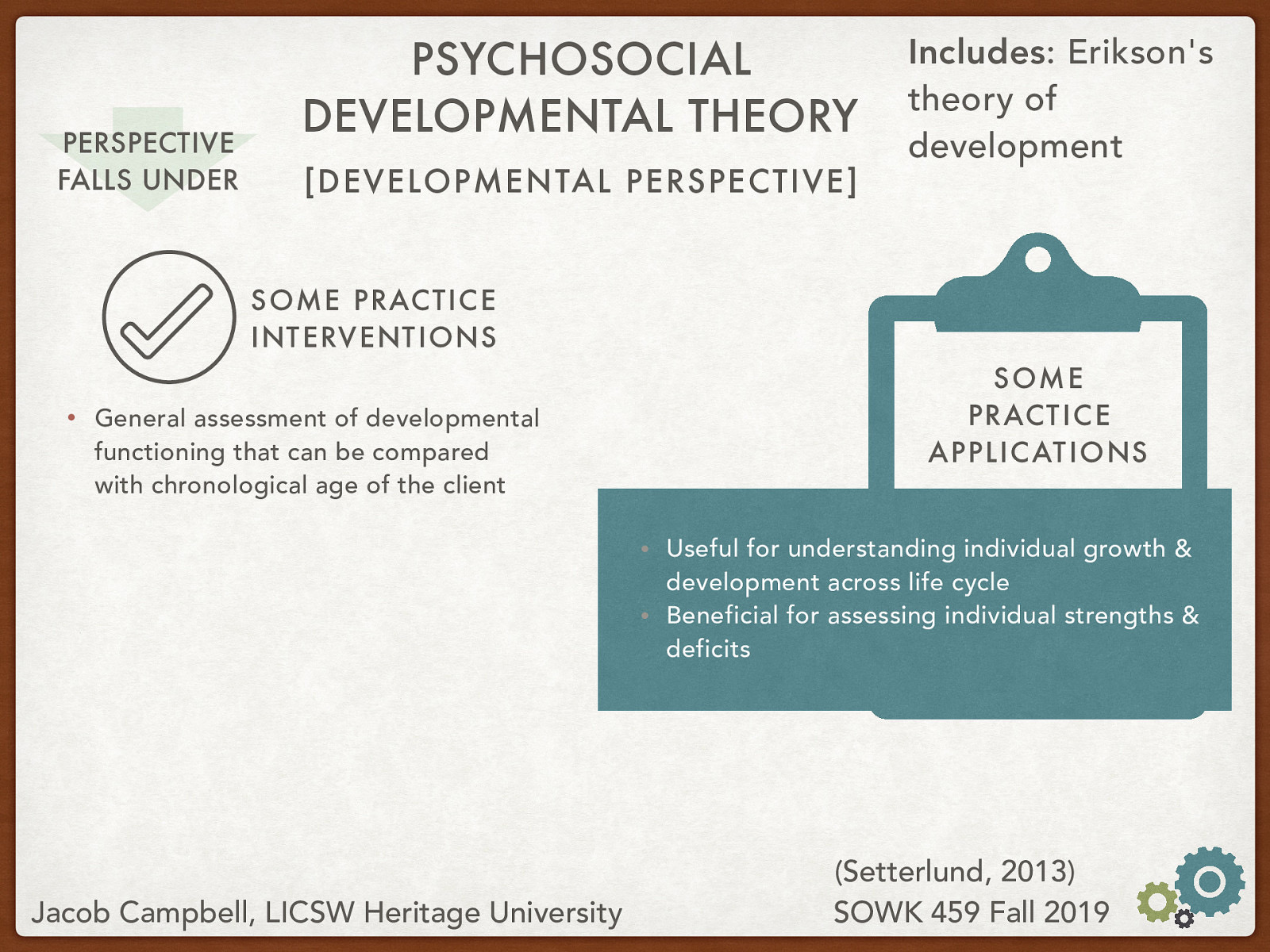
![Theory Name: Transpersonal Theory Underlying Perspective: [Developmental Perspective; built upon Humanistic Perspective] Focus of the Theory: How the spiritual and religious aspects of human existence can be understood; How spiritual development builds upon and goes beyond biopsychosocial development Main Components in Human Behavior: Focuses on meaning, connection, and purpose Some people achieve developmental level beyond the personal (ego-based) level into transpersonal (beyond self or ego) levels of consciousness and functioning. There is an inherent tendency to express innate potentials for love, creativity, and spirituality There is a difference between psychopathological phenomena and spiritual growth experiences Theorists: Maslow, Jung, Fowler, Wilber, Washburn](https://presentations.jacobrcampbell.com/QvE8EJ/deck-3553-large-32.jpeg)
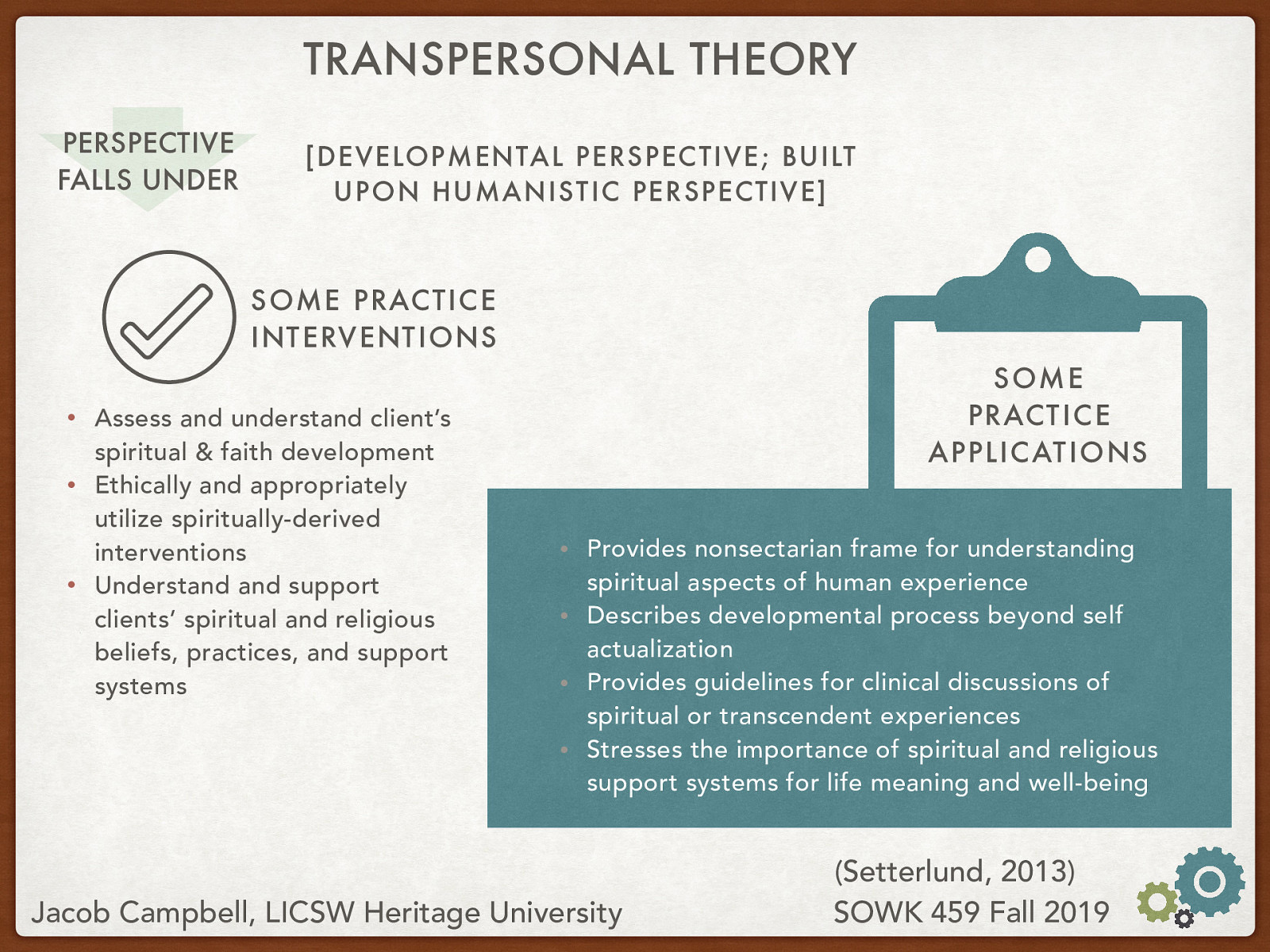
![Theory Name: Social Exchange Theory Underlying Perspective: [Rational Choice Perspective] Focus of the Theory: How persons minimize costs and maximize rewards through social exchange Main Components in Human Behavior: Antecedents, consequences, personal expectations, and interpretation shape and maintain behavior in the present Self-interest determines social exchange Unequal resources determine power inequities and reciprocity is essential Six propositions: Success proposition Stimulus proposition Value proposition Deprivation-satiation to proposition Aggression-approval proposition Rationality proposition Theorists: Homan, Thibault, Kelley, Blau](https://presentations.jacobrcampbell.com/QvE8EJ/deck-3553-large-34.jpeg)
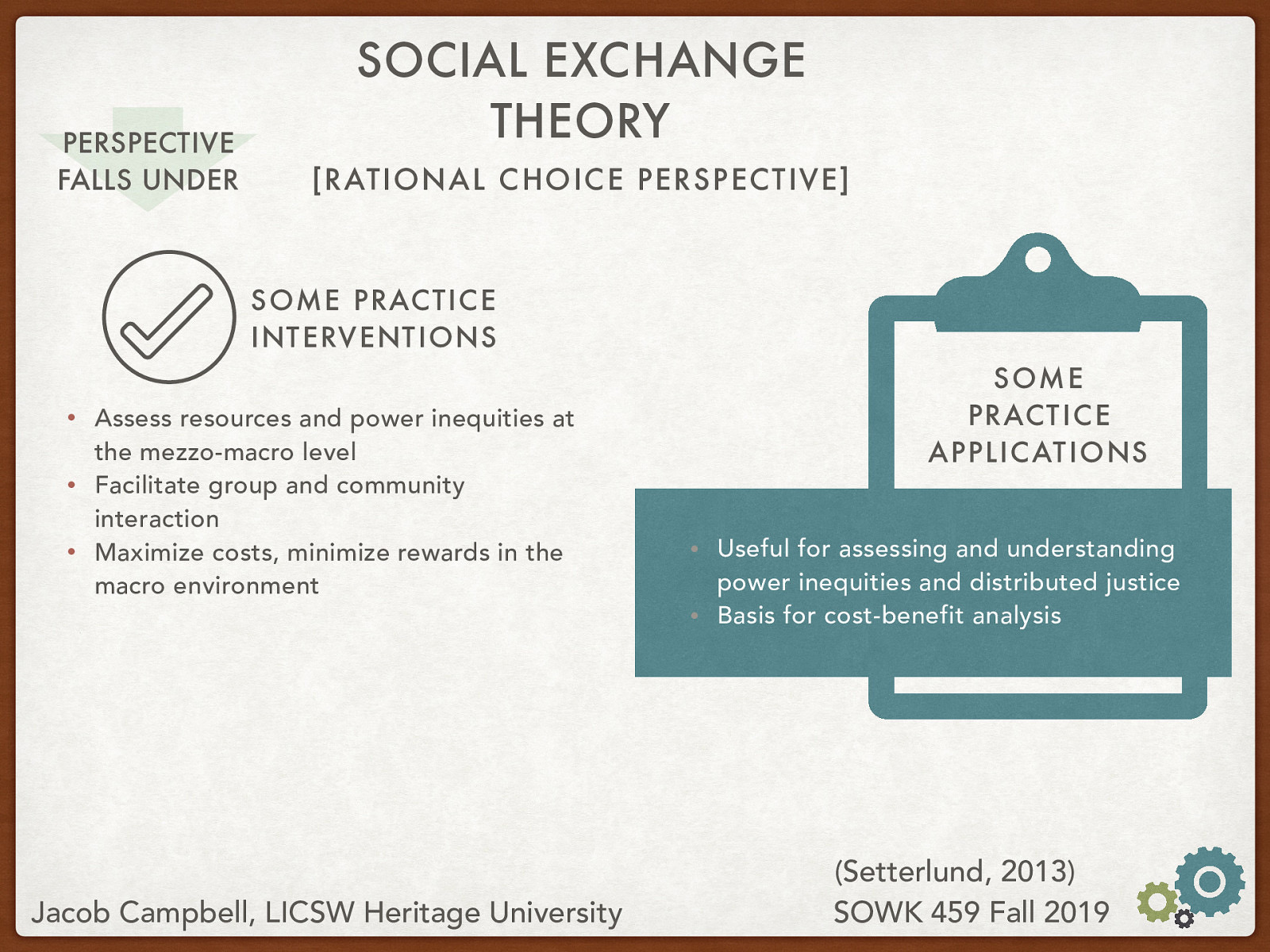
![Theory Name: Social Constructionism Underlying Perspective: [Social Constructionist Perspective] Focus of the Theory: How sociocultural and historical contexts shape individuals and the creation of knowledge; How individuals create themselves . Main Components in Human Behavior: All experience is subjective and human beings recreate themselves through an on-going, never static process Knowledge is created through an interplay of multiple social and historical forces Social interaction is grounded in language, customs, cultural and historical contexts All phenomenon, including the sciences, must be approached with doubt in order to understand how people construct reality Humans are self-interpreting beings Theorists: Foucault, Berger, Luckmann, Gergen](https://presentations.jacobrcampbell.com/QvE8EJ/deck-3553-large-36.jpeg)
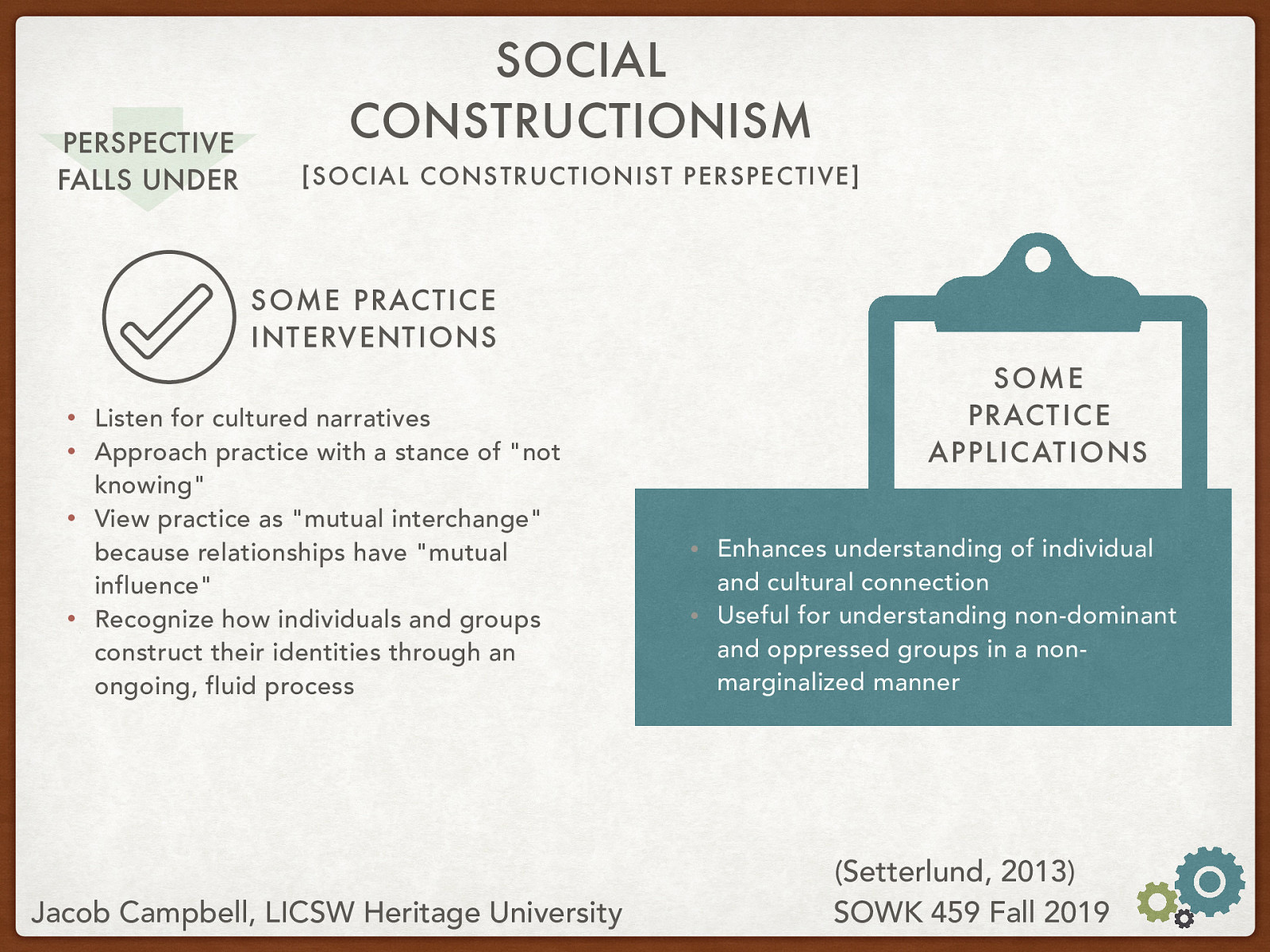
![Theory Name: Symbolic Interactionism Underlying Perspective: [Social Constructionist Perspective] Focus of the Theory: How the “self” is influenced and shaped by social processes and the capacity to symbolize Main Components in Human Behavior: Human action is caused by complex interaction between and within individuals Dynamic social activities take place among persons and we act according to how we define our situation We act in the present, not the past Individuals are actors on the stage and take on roles, interacting with the environment Theorists: Charon, Mead, Goffman](https://presentations.jacobrcampbell.com/QvE8EJ/deck-3553-large-38.jpeg)
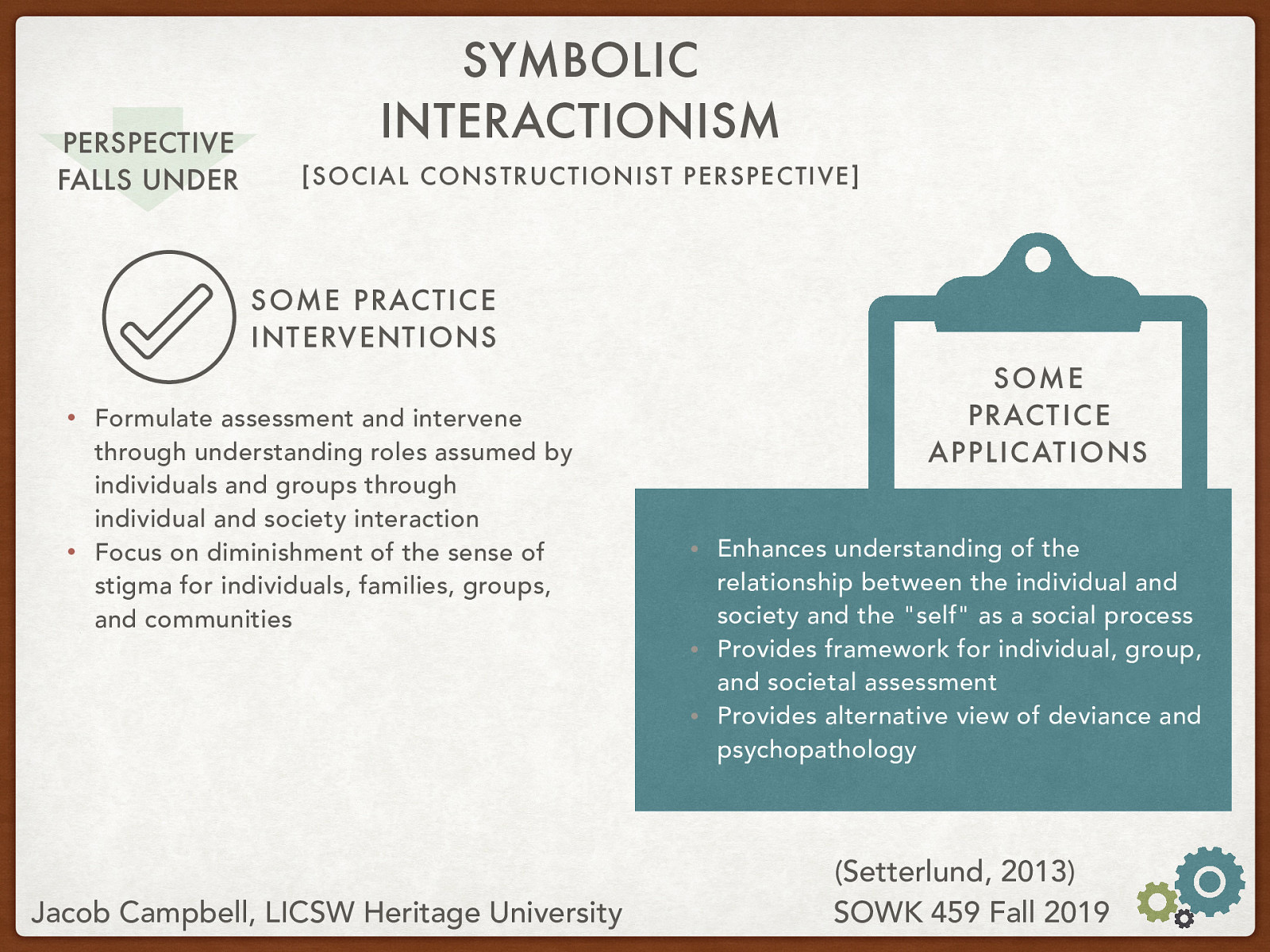
![Theory Name: Conflict Theory Underlying Perspective: [Conflict Perspective] Focus of the Theory: How power structures & power disparities impact people’s lives Main Components in Human Behavior: All societies perpetuate some forms of oppression & injustice and structural inequity Power is unequally divided & some groups dominate others Social order is based on manipulation and control by dominant groups Social change is driven by conflict, with periods of change interrupting periods of stability Life is characterized by conflict not consensus Theorists: Marx, Marcuse, Haberrmas, Feminist theorists, LGBTQ theorists](https://presentations.jacobrcampbell.com/QvE8EJ/deck-3553-large-40.jpeg)
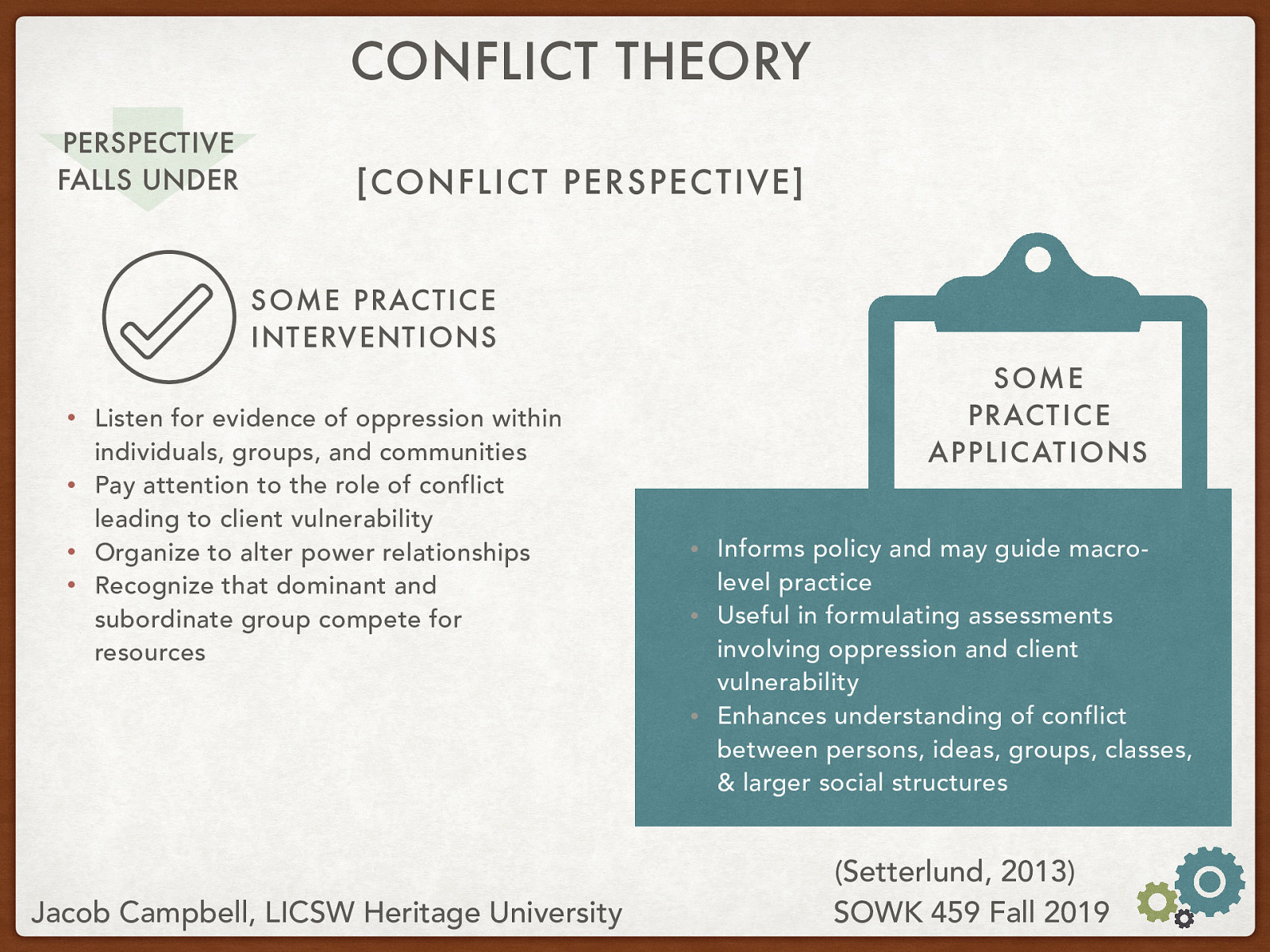
![Theory Name: Contingency Theory Underlying Perspective: [Systems Perspective] Focus of the Theory: How individuals & groups gain power, access to resources, & control over their lives, often through collective action Main Components in Human Behavior: Groups are open, dynamic systems with both change and conflict present Groups are stratified, with different and unequal levels of power and control High discrimination and low privilege equals low opportunity Oppression occurs when upward mobility is systematically denied The social context must be critiqued and deconstructed Assumptions for analyzing organizations: there is no best way to manage organizations there must be a match between the environment and internal resources the design of the organization must fit with the environment Theorists: Weber, Lawrence, Lorsch, March](https://presentations.jacobrcampbell.com/QvE8EJ/deck-3553-large-42.jpeg)
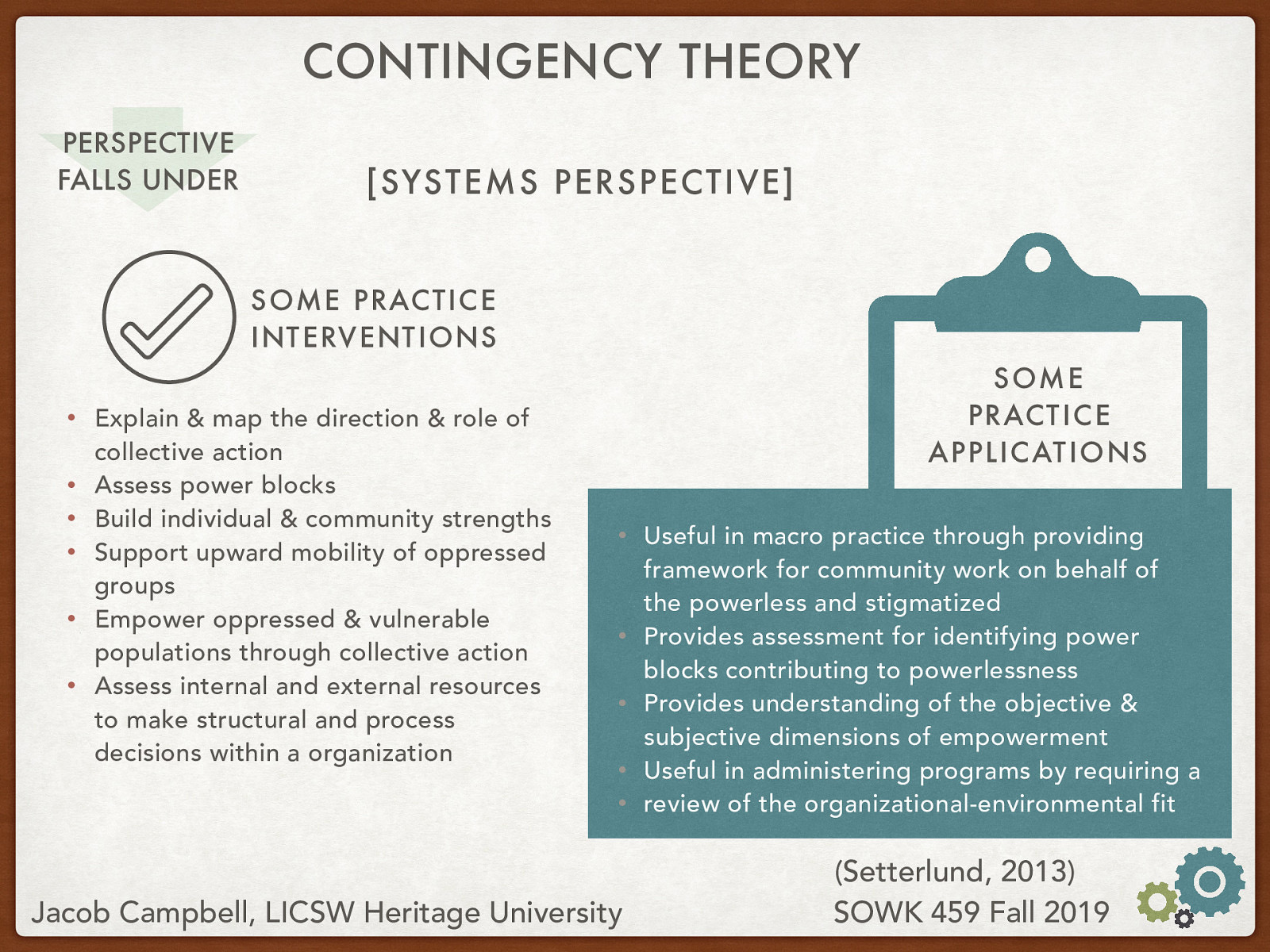
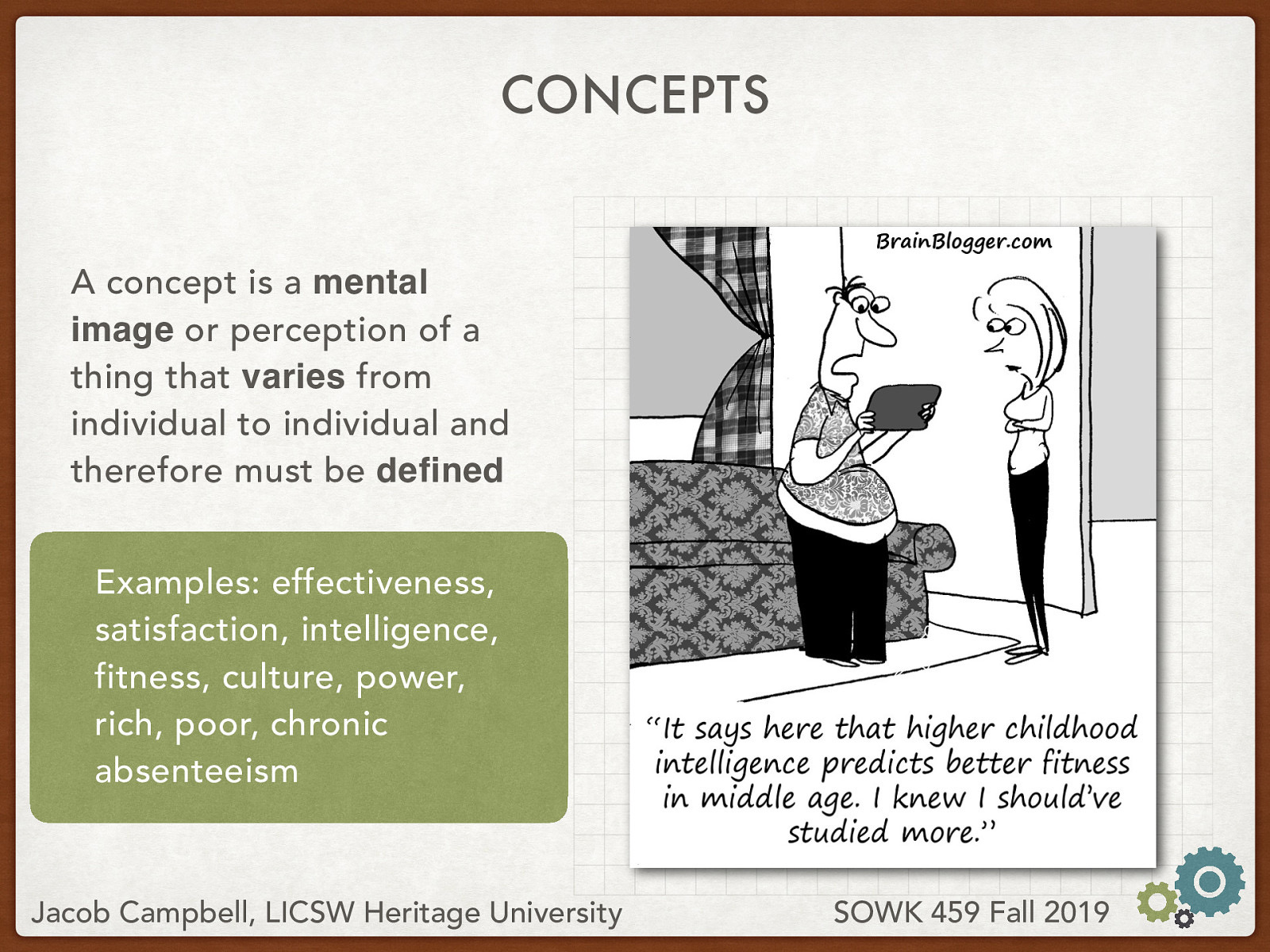
![With all of these paradigms and theories they come into conflict with each other. A helpful way of watching and considering this is through Karl Poppers theory of falsification. [Whole Class Activity] Watch the video [Whole Class Activity - Discuss] How these theories conflict. How this can become confusing quickly… etc. BBC Radio 4 (2015 August 8) Karl popper’s falsification. Retreived from https://youtu.be/wf-sGqBsWv4](https://presentations.jacobrcampbell.com/QvE8EJ/deck-3553-large-45.jpeg)

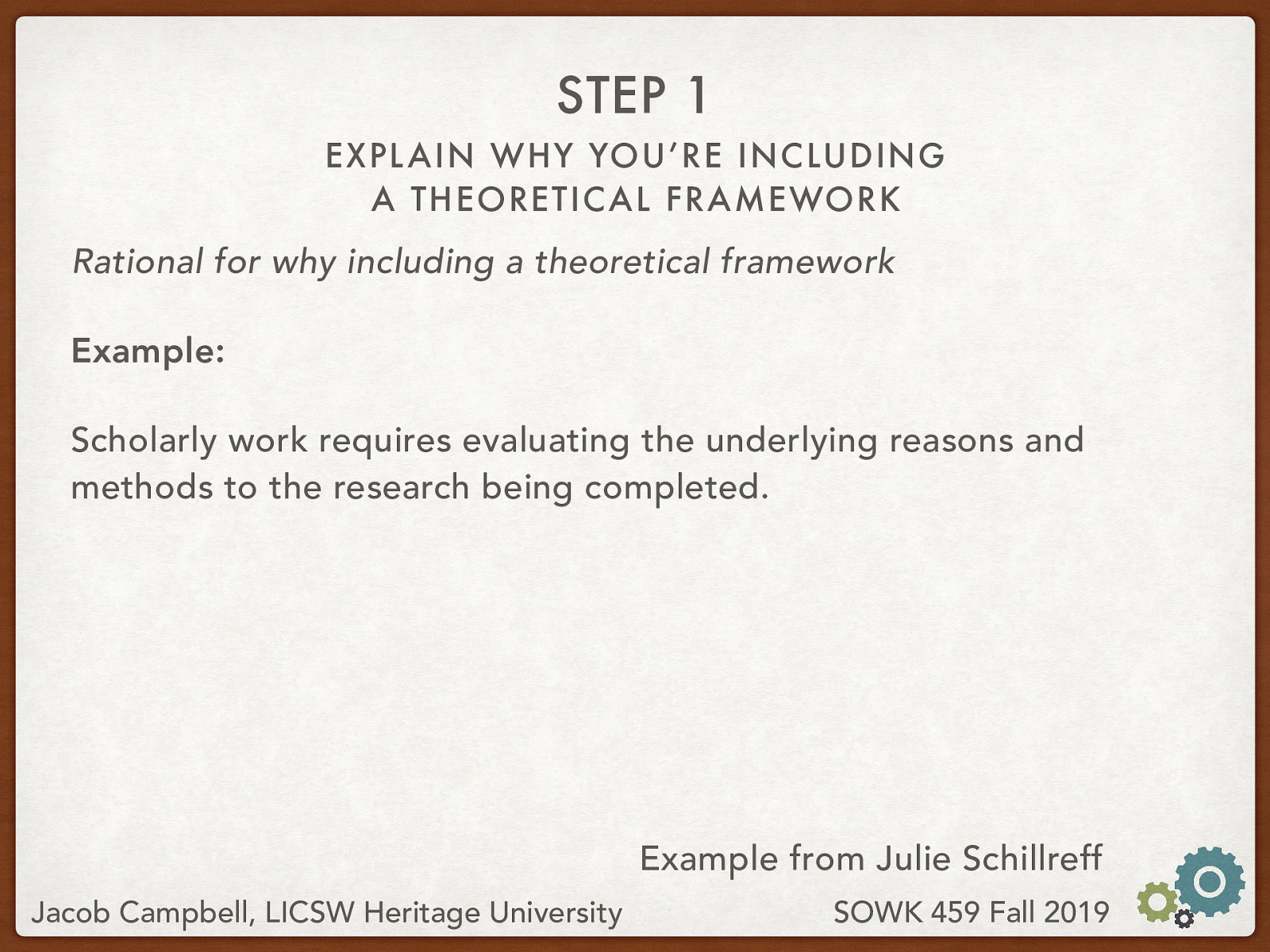
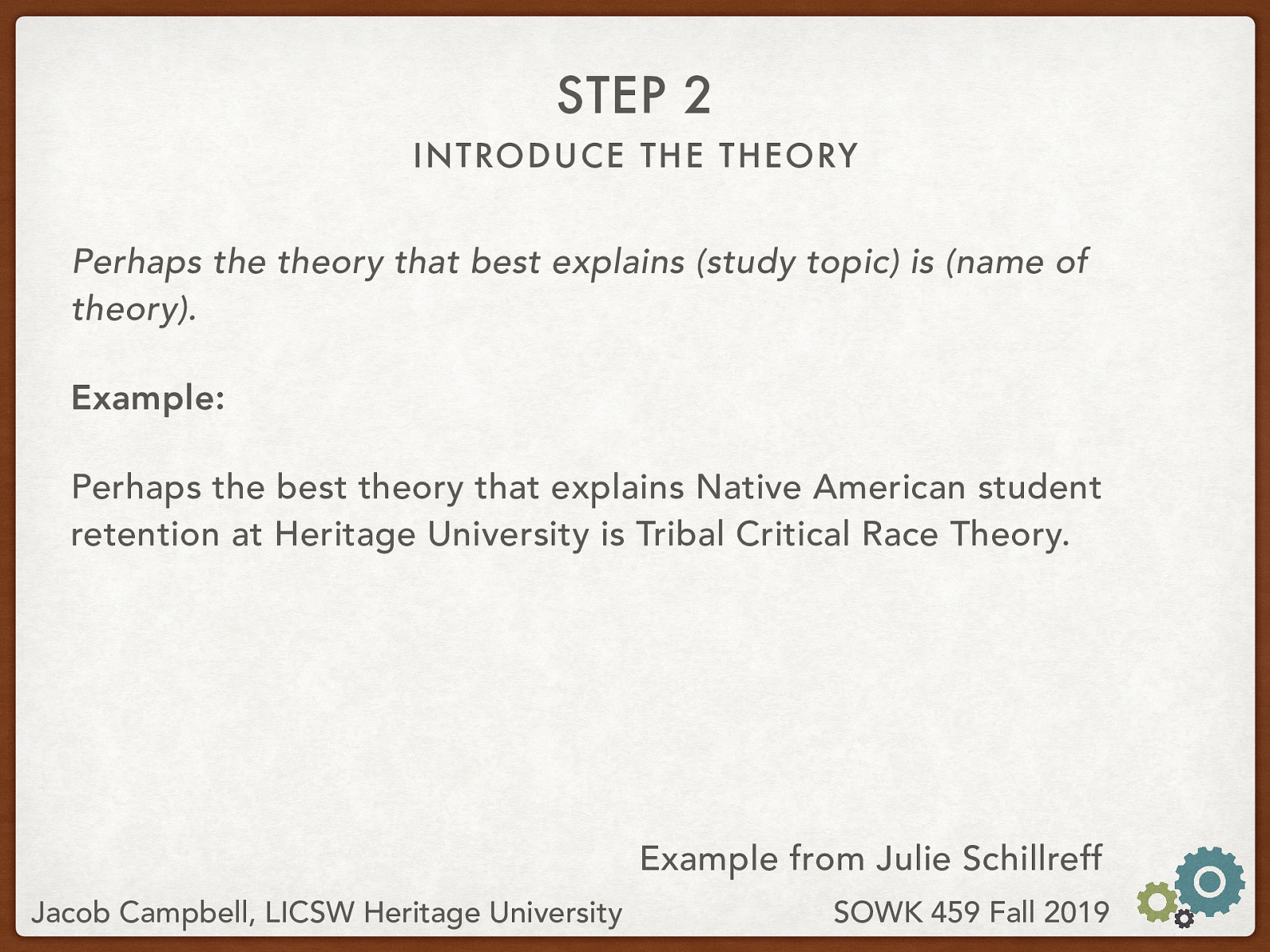
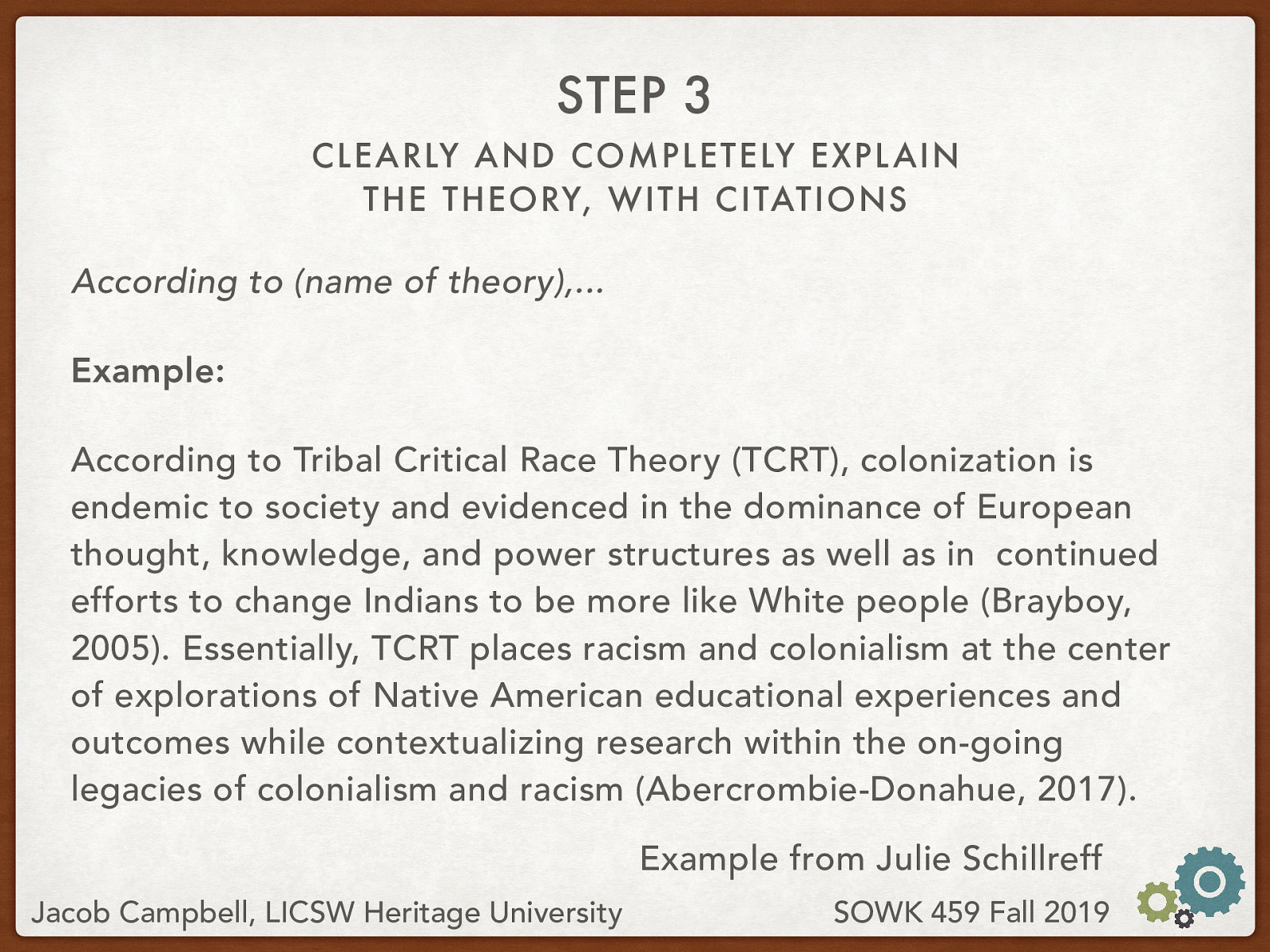

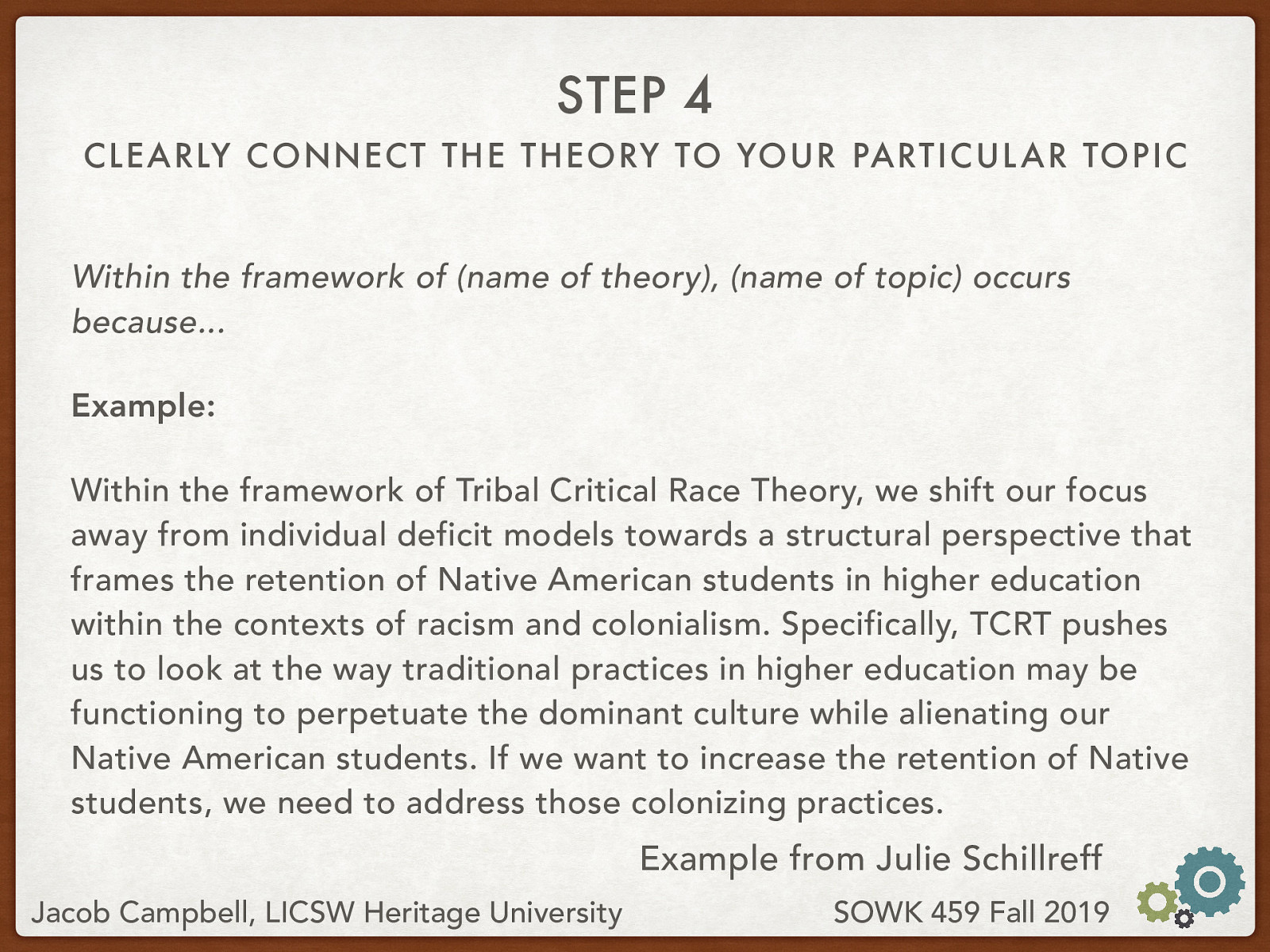
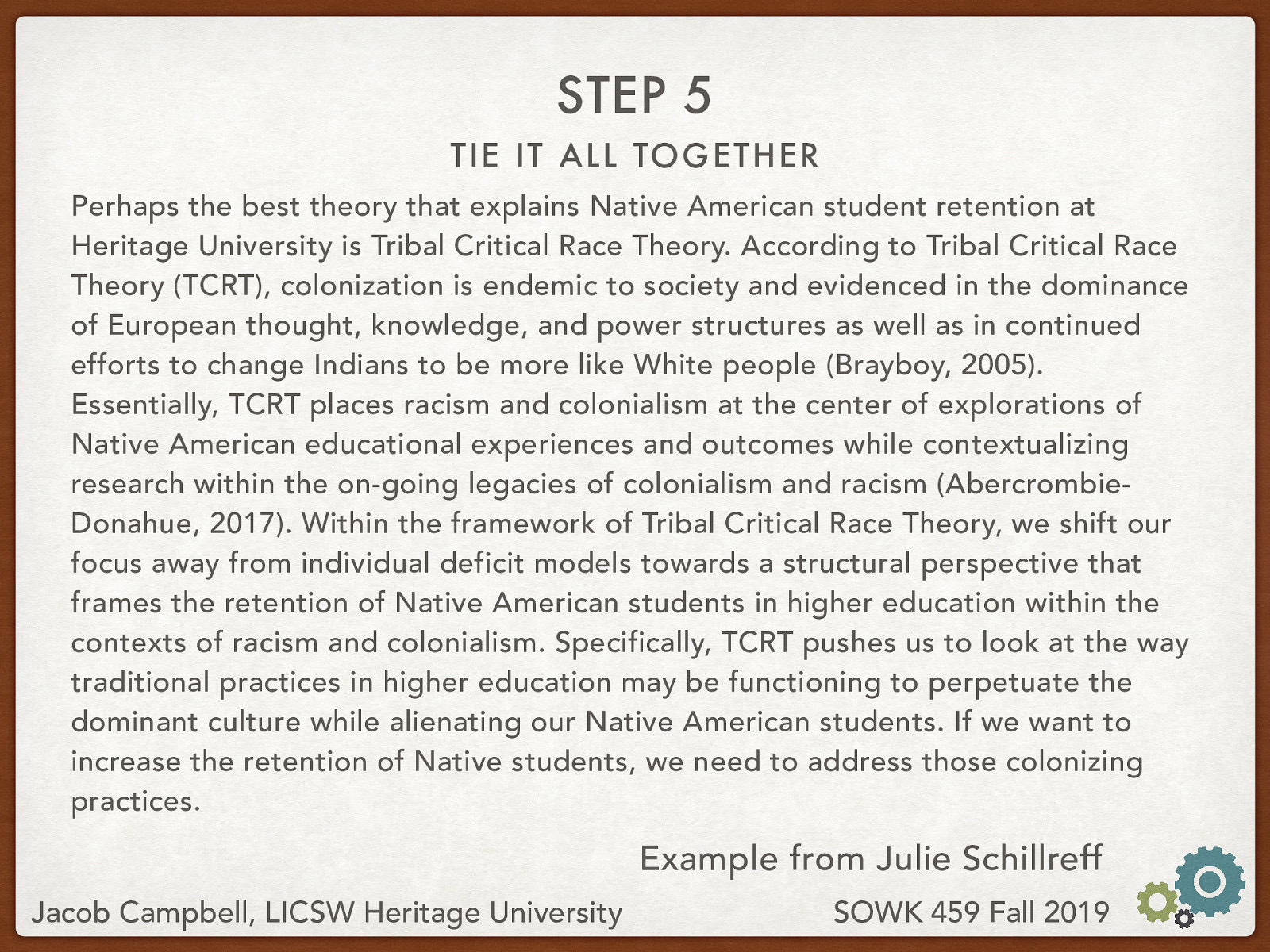

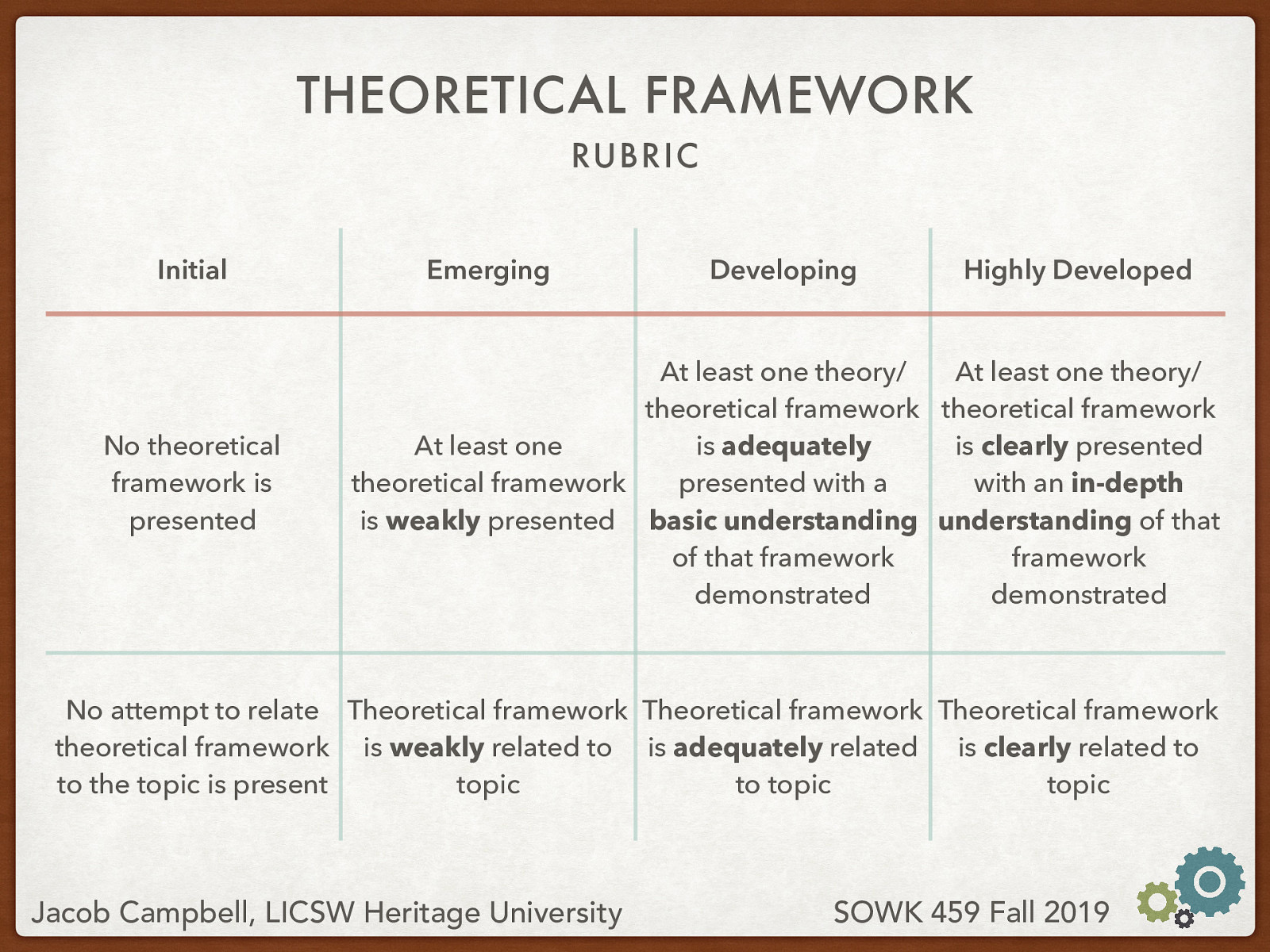
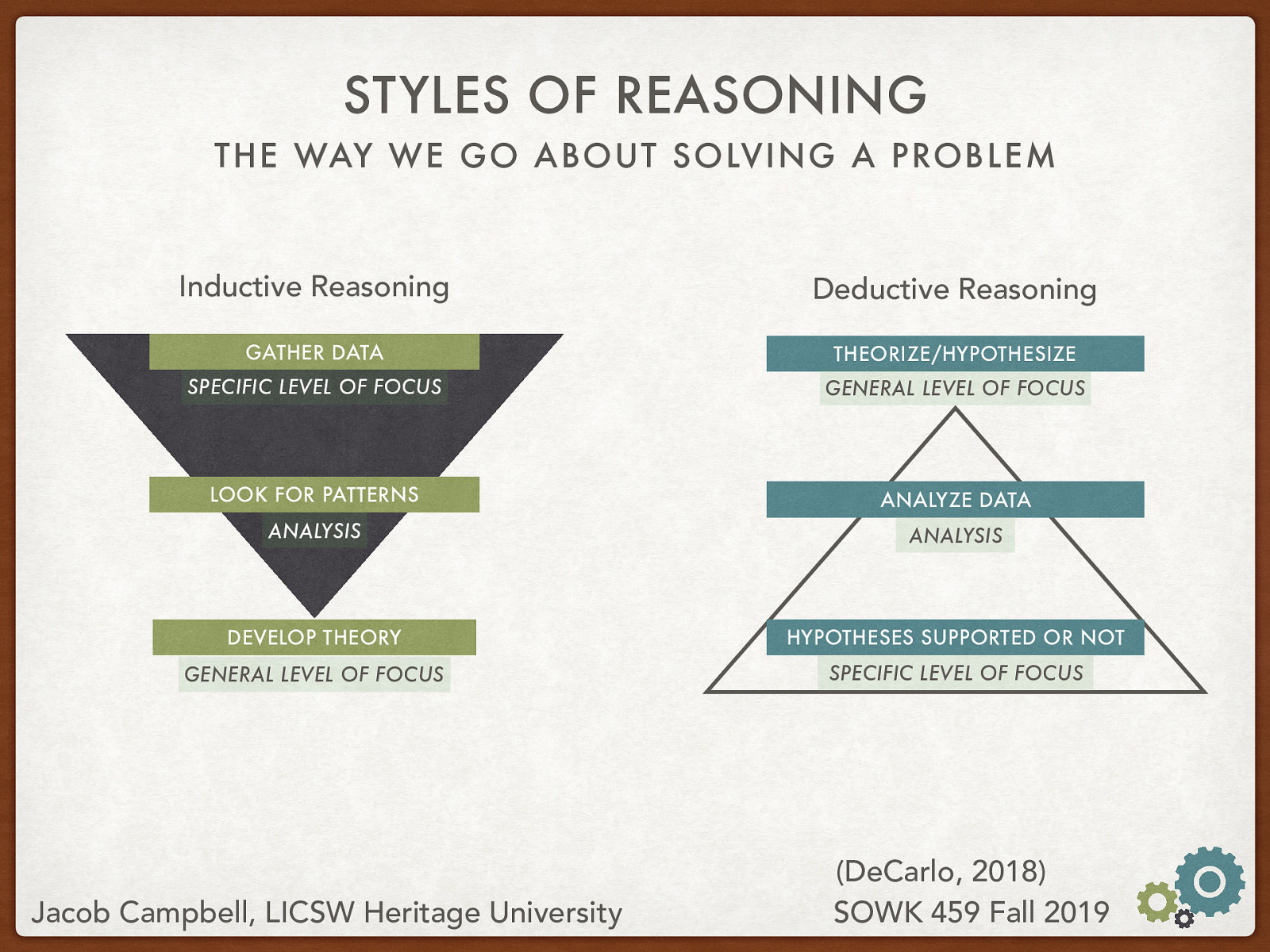
![To help us look into and understand these forms of reasoning, lets dive into some data published by the Guardian by Hardy (2016) [Whole Class Activity] Open the webpage, show that it talks about some stories of social workers and why they became social works. [Small Group Activity] Have students break up into small groups and talk about how they would approach the question of how do social workers from an inductive and a deductive approach Hardy, R. (2016 March 14) Why I became a social worker. Retrieved from https://www.theguardian.com/social-care-network/2016/mar/15/why-i-became-a-social-worker.](https://presentations.jacobrcampbell.com/QvE8EJ/deck-3553-large-56.jpeg)
![[Whole Class Activity - Discussion] Take the class through what they might think about for inductive reasoning. Why do undergraduate students choose social work? What should we do first? What should we do next? Where do we end up?](https://presentations.jacobrcampbell.com/QvE8EJ/deck-3553-large-57.jpeg)
![[Whole Class Activity - Discussion] Take the class through what they might think about for deductive reasoning. Why do undergraduate students choose social work? What should we do first?(Hypothesis?) What should we do next?(Survey?) Where do we end up?](https://presentations.jacobrcampbell.com/QvE8EJ/deck-3553-large-58.jpeg)
